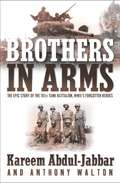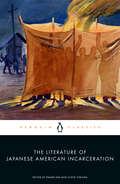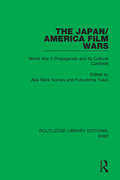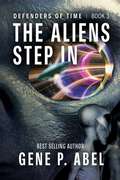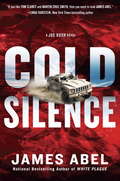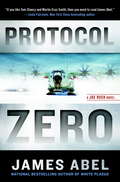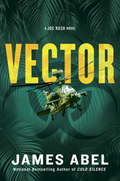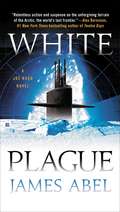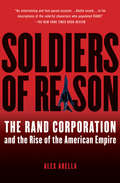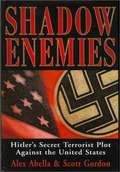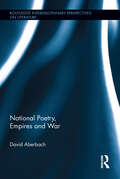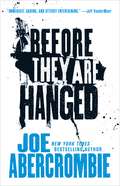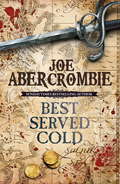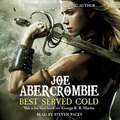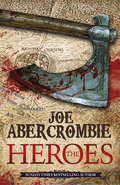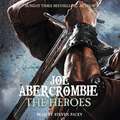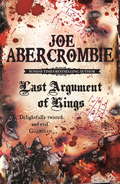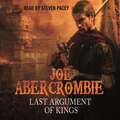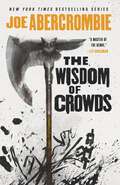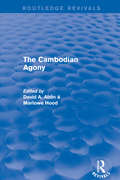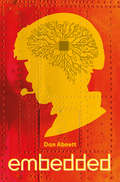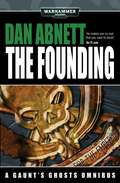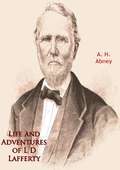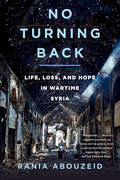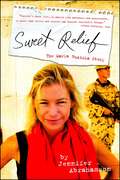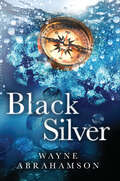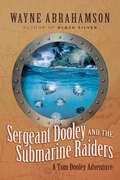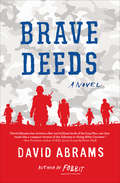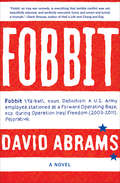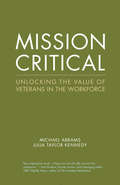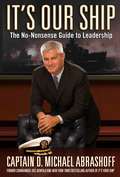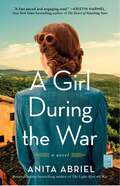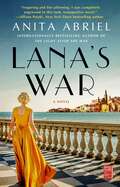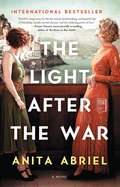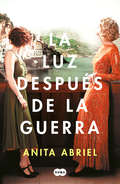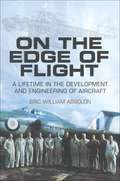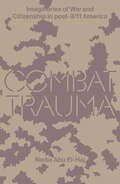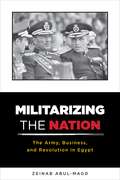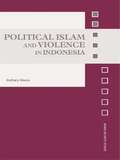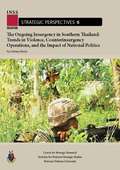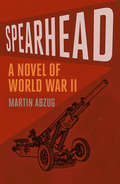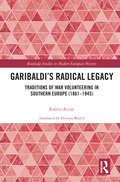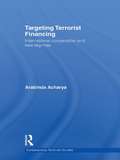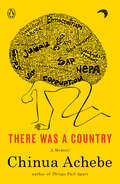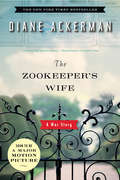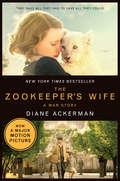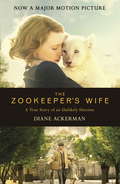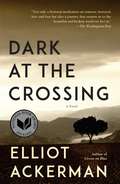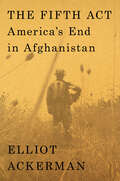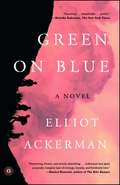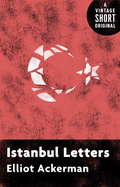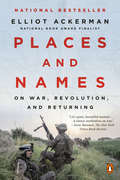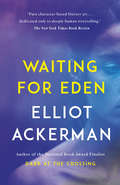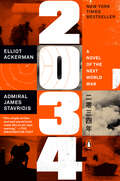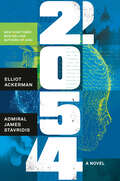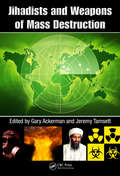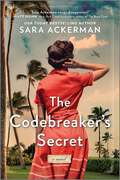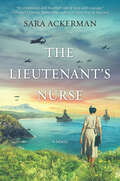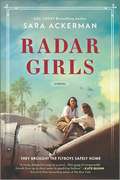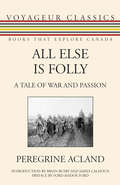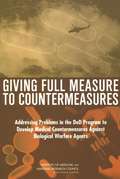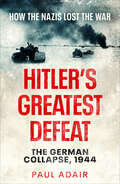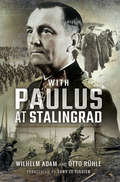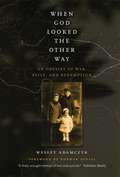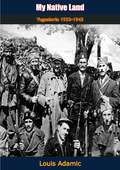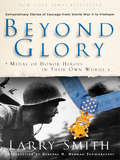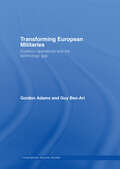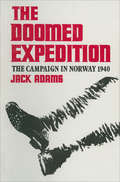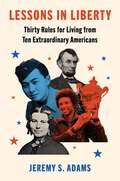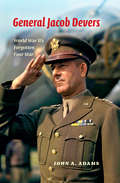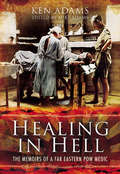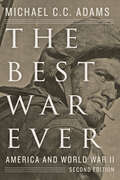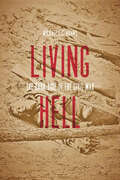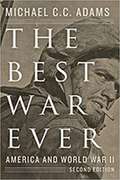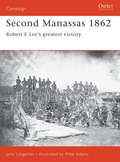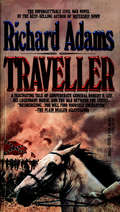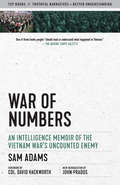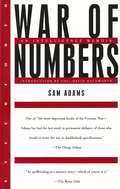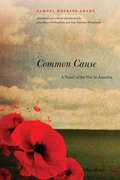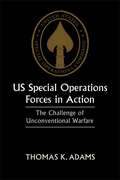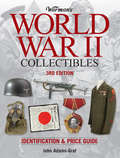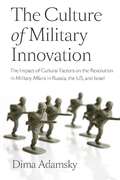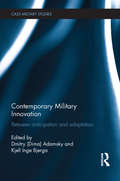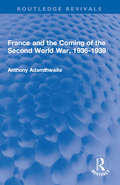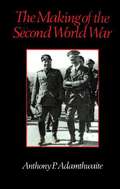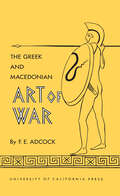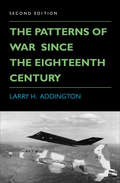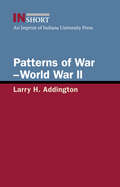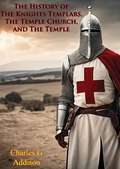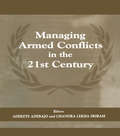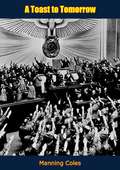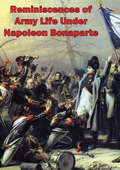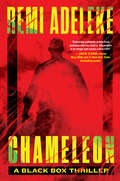- Table View
- List View
Brothers in Arms: THE EPIC STORY OF THE 761ST TANK BATTALION, WWII'S FORGOTTEN HEROES
by Kareem Abdul-Jabbar Anthony WaltonA powerful wartime saga in the bestselling tradition of Flags of Our Fathers, Brothers in Arms recounts the extraordinary story of the 761st Tank Battalion, the first all-black armored unit to see combat in World War II.
The Literature of Japanese American Incarceration
by Frank Abe Floyd CheungThe collective voice of Japanese Americans defined by a specific moment in time: the four years of World War II during which the US government expelled resident aliens and its own citizens from their homes and imprisoned 125,000 of them in American concentration camps, based solely upon the race they shared with a wartime enemy.A Penguin ClassicThis anthology presents a new vision that recovers and reframes the literature produced by the people targeted by the actions of President Franklin D. Roosevelt and Congress to deny Americans of Japanese ancestry any individual hearings or other due process after the Japanese attack at Pearl Harbor. From nearly seventy selections of fiction, poetry, essays, memoirs, and letters emerges a shared story of the struggle to retain personal integrity in the face of increasing dehumanization – all anchored by the key government documents that incite the action.The selections favor the pointed over the poignant, and the unknown over the familiar, with several new translations among previously unseen works that have been long overlooked on the shelf, buried in the archives, or languished unread in the Japanese language. The writings are presented chronologically so that readers can trace the continuum of events as the incarcerees experienced it.The contributors span incarcerees, their children born in or soon after the camps, and their descendants who reflect on the long-term consequences of mass incarceration for themselves and the nation. Many of the voices are those of protest. Some are those of accommodation. All are authentic. Together they form an epic narrative with a singular vision of America&’s past, one with disturbing resonances with the American present.
The Japan/America Film Wars: World War II Propaganda and its Cultural Contexts (Routledge Library Editions: WW2 #15)
by Abé Mark Nornes and Fukushima YukioWith contributions from noted critics and film historians from both countries, this book, first published in 1994, examines some of the most innovative and disturbing propaganda ever created. It analyses the conflicting images of these films and their effectiveness in defining public perception of the enemy. It also offers pointed commentary on the power of visual imagery to enhance racial tensions and enforce both positive and negative stereotypes of the Other.
The Aliens Step In
by Gene P. AbelIn the final installment of the Defenders of Time science fiction trilogy by Gene P. Able, The Aliens Step In, everything changes. Agent Lou Hessman and his team discover parts of their time travel facility are disappearing. The Chinese spies behind this event have successfully altered the past—and they are using means beyond current human technology that could prove disastrous for the time and space continuum. With only a small window of opportunity before their time travel operation is completely erased, the U. S. team visits the past to try and erase the Chinese attack in the first place. The impacts of interfering with time go far beyond anything Agent Hessman and his intrepid team of time defenders could have imagined—worlds beyond, in fact. Their efforts bring them face-to-face with an alien being, Sonsa Tabbak, who arrives to stop human time travel before a universal catastrophe can occur. What happens next changes everything, everywhere, forever. We are not alone. For more information go to: genepabelbooks.com
Cold Silence (Joe Rush #3)
by James AbelJames Abel--author of the electrifying Joe Rush novels Protocol Zero and White Plague--unleashes another heartstopping thriller in which an unholy plague from the past has been awakened...While trying to alleviate the suffering of thousands in drought-stricken, war-torn Africa, ex-Marine doctor and bio-terror expert Joe Rush receives a plea for help from a member of his old military unit, currently working as a geologist in a chaotic region of Somalia.Joe arrives on the scene to find an entire group showing horrific symptoms of an ancient sickness once thought to be sent as punishment from heaven. But before Joe can get hard evidence identifying the illness, a local warlord takes matters into his own hands--and the proof is gone just as the illness breaks out back in the United States.This outbreak is not a curse from God. It's a well-coordinated, meticulously planned attack with a specific goal that could overturn global stability and kill millions. And the only one who can stop the downfall of civilization is Joe Rush...From the Hardcover edition.
Protocol Zero
by James AbelMarine doctor and bio-terror expert Joe Rush returns in an electrifying new arctic adventure in which an apocalyptic plague threatens all of humanity ...
Vector
by James AbelJoe Rush takes on a new terror, spawned in the Amazon rain forest, that threatens to bring the world to its knees in James Abel's latest bio-thriller, now in paperback.While studying new forms of malaria at an Amazon gold rush, Joe Rush's best friend and partner, Eddie Nakamura, disappears. Learning that many of the sick miners have also vanished, Rush begins a search for Eddie that takes him into the heart of darkness--where while battling for his life, he discovers a secret that may change the world. Thousands of miles away, sick people are starting to flood into U.S. hospitals. When the White House admits that it has received terrorist threats, cities across the Northeast begin to shut down. Rush and his team must journey from one of the most remote spots on Earth to one of the busiest, as the clock ticks toward a kind of annihilation not thought possible. They have even less time than they think to solve the mystery, for the danger--as bad as it is--is about to get even worse.
White Plague (Joe Rush Series #1)
by James AbelIn the frozen waters of the Arctic, Marine bioterror expert Joe Rush races to save a submarine crew from a lethal threat..."The pleas for help stopped coming just after five in the morning, Washington time. <P><P> The Pentagon staffers cleared for handling sensitive messages sat in horror for a moment and then tried other ways to reach the victims. Nothing worked so they called the Director, who phoned me."In the remote, frozen waters of the Arctic Ocean, the high-powered and technically advanced submarine U.S.S. Montana is in peril. Adrift and in flames, the boat--and the entire crew--could be lost. The only team close enough to get to them in time is led by Marine doctor and bio-terror expert Joe Rush.With only thirty-six hours before the surviving crew perish, Joe and his team must race to rescue the Montana and ensure that the boat doesn't fall into enemy hands. <P> Because a fast-approaching foreign submarine is already en route, and tensions may explode.But that's the least of their troubles. For the surviving sailors are not alone on the sub. Something is trapped with them. Something deadly lethal. Something that plagued mankind long ago, when it devastated the entire world. And the crew of the Montana has unknowingly set it free. Now, Joe and his team must not only find a way to save the Montana and her crew, but stop a lethal horror of apocalyptic consequence from being unleashed on all humanity.
Soldiers of Reason: The RAND Corporation and the Rise of the American Empire
by Alex AbellaAn &“entertaining and fast-paced&” account of the organization that defines the military-industrial complex—and continues to shape our world today (The New York Times Book Review). The RAND Corporation was born in the wake of World War II as a think tank to generate research and analysis for the United States military. It was a magnet for the best and the brightest—and also the most dangerous. RAND quickly became the creator of America&’s anti-Soviet nuclear strategy, attracting such Cold War luminaries as Albert Wohlstetter, Bernard Brodie, and Herman Kahn, who arguably saved us from nuclear annihilation—and unquestionably created the military-industrial complex Eisenhower warned against. In the Kennedy era, RAND analysts and their theories of rational warfare steered our conduct in Vietnam. Those same theories drove our invasion of Iraq forty-five years later, championed by RAND affiliated actors such as Paul Wolfowitz, Donald Rumsfeld, and Zalmay Khalilzad. But RAND&’s greatest contribution might be its least known: rational choice theory, a model explaining all human behavior through self-interest. Through it RAND sparked the Reagan-led transformation of our social and economic system, but also unleashed a resurgence of precisely the forces whose existence it denied: religion, patriotism, tribalism. With Soldiers of Reason, Alex Abella shares a &“well-researched&” history of America&’s last half century that casts a new light on our problematic present (San Francisco Chronicle).
Shadow Enemies
by Alex Abella Scott Gordon"In 1942 two groups of German saboteurs, were landed on the Long Island and the Florida coasts with orders to blow up certain key plants and to cause panic in large cities."
National Poetry, Empires and War (Routledge Interdisciplinary Perspectives on Literature)
by David AberbachNationalism has given the world a genre of poetry bright with ideals of justice, freedom and the brotherhood of man, but also, at times, burning with humiliation and grievance, hatred and lust for revenge, driving human kind, as the Austrian poet Grillparzer put it, ‘From humanity via nationality to bestiality’. National Poetry, Empires and War considers national poetry, and its glorification of war, from ancient to modern times, in a series of historical, social and political perspectives. Starting with the Hebrew Bible and Homer and moving through the Crusades and examples of subsequent empires, this book has much on pre-modern national poetry but focuses chiefly on post-1789 poetry which emerged from the weakening and collapse of empires, as the idealistic liberalism of nationalism in the age of Byron, Whitman, D’Annunzio, Yeats, Bialik, and Kipling was replaced by darker purposes culminating in World War I and the rise of fascism. Many national poets are the subject of countless critical and biographical studies, but this book aims to give a panoramic view of national poetry as a whole. It will be of great interest to any scholars of nationalism, Jewish Studies, history, comparative literature, and general cultural studies.
Before They Are Hanged: The First Law: Book Two (The First Law Trilogy #2)
by Joe AbercrombieThe second novel in the wildly popular First Law Trilogy from New York Times bestseller Joe Abercrombie. Superior Glokta has a problem. How do you defend a city surrounded by enemies and riddled with traitors, when your allies can by no means be trusted, and your predecessor vanished without a trace? It's enough to make a torturer want to run -- if he could even walk without a stick. Northmen have spilled over the border of Angland and are spreading fire and death across the frozen country. Crown Prince Ladisla is poised to drive them back and win undying glory. There is only one problem -- he commands the worst-armed, worst-trained, worst-led army in the world. And Bayaz, the First of the Magi, is leading a party of bold adventurers on a perilous mission through the ruins of the past. The most hated woman in the South, the most feared man in the North, and the most selfish boy in the Union make a strange alliance, but a deadly one. They might even stand a chance of saving mankind from the Eaters -- if they didn't hate each other quite so much. Ancient secrets will be uncovered. Bloody battles will be won and lost. Bitter enemies will be forgiven -- but not before they are hanged. First Law TrilogyThe Blade ItselfBefore They Are HangedLast Argument of KingsFor more from Joe Abercrombie, check out:Novels in the First Law worldBest Served ColdThe HeroesRed Country
Best Served Cold: A First Law Novel
by Joe AbercrombieSpringtime in Styria. And that means war.There have been nineteen years of blood. The ruthless Grand Duke Orso is locked in a vicious struggle with the squabbling League of Eight, and between them they have bled the land white. While armies march, heads roll and cities burn, behind the scenes bankers, priests and older, darker powers play a deadly game to choose who will be king.War may be hell but for Monza Murcatto, the Snake of Talins, the most feared and famous mercenary in Duke Orso's employ, it's a damn good way of making money too. Her victories have made her popular - a shade too popular for her employer's taste. Betrayed, thrown down a mountain and left for dead, Murcatto's reward is a broken body and a burning hunger for vengeance. Whatever the cost, seven men must die.Her allies include Styria's least reliable drunkard, Styria's most treacherous poisoner, a mass-murderer obsessed with numbers and a Northman who just wants to do the right thing. Her enemies number the better half of the nation. And that's all before the most dangerous man in the world is dispatched to hunt her down and finish the job Duke Orso started...Springtime in Styria. And that means revenge.
Best Served Cold: A First Law Novel (World of the First Law)
by Joe AbercrombieSpringtime in Styria. And that means war.There have been nineteen years of blood. The ruthless Grand Duke Orso is locked in a vicious struggle with the squabbling League of Eight, and between them they have bled the land white. While armies march, heads roll and cities burn, behind the scenes bankers, priests and older, darker powers play a deadly game to choose who will be king.War may be hell but for Monza Murcatto, the Snake of Talins, the most feared and famous mercenary in Duke Orso's employ, it's a damn good way of making money too. Her victories have made her popular - a shade too popular for her employer's taste. Betrayed, thrown down a mountain and left for dead, Murcatto's reward is a broken body and a burning hunger for vengeance. Whatever the cost, seven men must die.Her allies include Styria's least reliable drunkard, Styria's most treacherous poisoner, a mass-murderer obsessed with numbers and a Northman who just wants to do the right thing. Her enemies number the better half of the nation. And that's all before the most dangerous man in the world is dispatched to hunt her down and finish the job Duke Orso started...Springtime in Styria. And that means revenge.
Best Served Cold: A First Law Novel (World of the First Law)
by Joe AbercrombieSpringtime in Styria. And that means war.There have been nineteen years of blood. The ruthless Grand Duke Orso is locked in a vicious struggle with the squabbling League of Eight, and between them they have bled the land white. While armies march, heads roll and cities burn, behind the scenes bankers, priests and older, darker powers play a deadly game to choose who will be king.War may be hell but for Monza Murcatto, the Snake of Talins, the most feared and famous mercenary in Duke Orso's employ, it's a damn good way of making money too. Her victories have made her popular - a shade too popular for her employer's taste. Betrayed, thrown down a mountain and left for dead, Murcatto's reward is a broken body and a burning hunger for vengeance. Whatever the cost, seven men must die.Her allies include Styria's least reliable drunkard, Styria's most treacherous poisoner, a mass-murderer obsessed with numbers and a Northman who just wants to do the right thing. Her enemies number the better half of the nation. And that's all before the most dangerous man in the world is dispatched to hunt her down and finish the job Duke Orso started...Springtime in Styria. And that means revenge.
The Heroes: A First Law Novel (World Of The First Law Ser.)
by Joe AbercrombieThey say Black Dow's killed more men than winter, and clawed his way to the throne of the North up a hill of skulls. The King of the Union, ever a jealous neighbour, is not about to stand smiling by while he claws his way any higher. The orders have been given and the armies are toiling through the northern mud.Thousands of men are converging on a forgotten ring of stones, on a worthless hill, in an unimportant valley, and they've brought a lot of sharpened metal with them.Bremer dan Gorst, disgraced master swordsman, has sworn to reclaim his stolen honour on the battlefield. Obsessed with redemption and addicted to violence, he's far past caring how much blood gets spilled in the attempt. Even if it's his own.Prince Calder isn't interested in honour, and still less in getting himself killed. All he wants is power, and he'll tell any lie, use any trick, and betray any friend to get it. Just as long as he doesn't have to fight for it himself.Curnden Craw, the last honest man in the North, has gained nothing from a life of warfare but swollen knees and frayed nerves. He hardly even cares who wins any more, he just wants to do the right thing. But can he even tell what that is with the world burning down around him?Over three bloody days of battle, the fate of the North will be decided. But with both sides riddled by intrigues, follies, feuds and petty jealousies, it is unlikely to be the noblest hearts, or even the strongest arms that prevail.Three men. One battle. No Heroes.
The Heroes: A First Law Novel (World of the First Law)
by Joe AbercrombieThey say Black Dow's killed more men than winter, and clawed his way to the throne of the North up a hill of skulls. The King of the Union, ever a jealous neighbour, is not about to stand smiling by while he claws his way any higher. The orders have been given and the armies are toiling through the northern mud.Thousands of men are converging on a forgotten ring of stones, on a worthless hill, in an unimportant valley, and they've brought a lot of sharpened metal with them.Bremer dan Gorst, disgraced master swordsman, has sworn to reclaim his stolen honour on the battlefield. Obsessed with redemption and addicted to violence, he's far past caring how much blood gets spilled in the attempt. Even if it's his own.Prince Calder isn't interested in honour, and still less in getting himself killed. All he wants is power, and he'll tell any lie, use any trick, and betray any friend to get it. Just as long as he doesn't have to fight for it himself.Curnden Craw, the last honest man in the North, has gained nothing from a life of warfare but swollen knees and frayed nerves. He hardly even cares who wins any more, he just wants to do the right thing. But can he even tell what that is with the world burning down around him?Over three bloody days of battle, the fate of the North will be decided. But with both sides riddled by intrigues, follies, feuds and petty jealousies, it is unlikely to be the noblest hearts, or even the strongest arms that prevail.Three men. One battle. No Heroes.
The Heroes: A First Law Novel (World of the First Law)
by Joe AbercrombieThey say Black Dow's killed more men than winter, and clawed his way to the throne of the North up a hill of skulls. The King of the Union, ever a jealous neighbour, is not about to stand smiling by while he claws his way any higher. The orders have been given and the armies are toiling through the northern mud. Thousands of men are converging on a forgotten ring of stones, on a worthless hill, in an unimportant valley, and they've brought a lot of sharpened metal with them. Bremer dan Gorst, disgraced master swordsman, has sworn to reclaim his stolen honour on the battlefield. Obsessed with redemption and addicted to violence, he's far past caring how much blood gets spilled in the attempt. Even if it's his own.Prince Calder isn't interested in honour, and still less in getting himself killed. All he wants is power, and he'll tell any lie, use any trick, and betray any friend to get it. Just as long as he doesn't have to fight for it himself.Curnden Craw, the last honest man in the North, has gained nothing from a life of warfare but swollen knees and frayed nerves. He hardly even cares who wins any more, he just wants to do the right thing. But can he even tell what that is with the world burning down around him?Over three bloody days of battle, the fate of the North will be decided. But with both sides riddled by intrigues, follies, feuds and petty jealousies, it is unlikely to be the noblest hearts, or even the strongest arms that prevail.Three men. One battle. No Heroes.
Last Argument Of Kings: Book Three (The\first Law Ser. #Bk. 3)
by Joe AbercrombieThe end is coming.Logen Ninefingers might only have one more fight in him - but it's going to be a big one. Battle rages across the North, the King of the Northmen still stands firm, and there's only one man who can stop him. His oldest friend, and his oldest enemy. It's past time for the Bloody-Nine to come home.With too many masters and too little time, Superior Glokta is fighting a different kind of war. A secret struggle in which no-one is safe, and no-one can be trusted. His days with a sword are far behind him. It's a good thing blackmail, threats and torture still work well enough.Jezal dan Luthar has decided that winning glory is far too painful, and turned his back on soldiering for a simple life with the woman he loves. But love can be painful too, and glory has a nasty habit of creeping up on a man when he least expects it.While the King of the Union lies on his deathbead, the peasants revolt and the nobles scramble to steal his crown. No-one believes that the shadow of war is falling across the very heart of the Union. The First of the Magi has a plan to save the world, as he always does. But there are risks. There is no risk more terrible, after all, than to break the First Law...
Last Argument Of Kings: Book Three (The First Law #Bk. 3)
by Joe AbercrombieThe end is coming.Logen Ninefingers might only have one more fight in him - but it's going to be a big one. Battle rages across the North, the King of the Northmen still stands firm, and there's only one man who can stop him. His oldest friend, and his oldest enemy. It's past time for the Bloody-Nine to come home.With too many masters and too little time, Superior Glokta is fighting a different kind of war. A secret struggle in which no-one is safe, and no-one can be trusted. His days with a sword are far behind him. It's a good thing blackmail, threats and torture still work well enough.Jezal dan Luthar has decided that winning glory is far too painful, and turned his back on soldiering for a simple life with the woman he loves. But love can be painful too, and glory has a nasty habit of creeping up on a man when he least expects it.While the King of the Union lies on his deathbead, the peasants revolt and the nobles scramble to steal his crown. No-one believes that the shadow of war is falling across the very heart of the Union. The First of the Magi has a plan to save the world, as he always does. But there are risks. There is no risk more terrible, after all, than to break the First Law...
Last Argument Of Kings: Book Three (The First Law)
by Joe AbercrombieThe end is coming.Logen Ninefingers might only have one more fight in him - but it's going to be a big one. Battle rages across the North, the King of the Northmen still stands firm, and there's only one man who can stop him. His oldest friend, and his oldest enemy. It's past time for the Bloody-Nine to come home.With too many masters and too little time, Superior Glokta is fighting a different kind of war. A secret struggle in which no-one is safe, and no-one can be trusted. His days with a sword are far behind him. It's a good thing blackmail, threats and torture still work well enough.Jezal dan Luthar has decided that winning glory is far too painful, and turned his back on soldiering for a simple life with the woman he loves. But love can be painful too, and glory has a nasty habit of creeping up on a man when he least expects it.While the King of the Union lies on his deathbead, the peasants revolt and the nobles scramble to steal his crown. No-one believes that the shadow of war is falling across the very heart of the Union. The First of the Magi has a plan to save the world, as he always does. But there are risks. There is no risk more terrible, after all, than to break the First Law...
The Wisdom of Crowds (The Age of Madness #3)
by Joe AbercrombieFrom the New York Times bestselling author of A Little Hatred comes the stunning conclusion to the Age of Madness trilogy where the world finds itself in an unstoppable revolution, and the heroes have nothing left to lose as darkness and destruction overtake everything . . . <P><P>Chaos. Fury. Destruction.The Great Change is upon us . . .Some say that to change the world you must first burn it down. Now that belief will be tested in the crucible of revolution: the Breakers and Burners have seized the levers of power, the smoke of riots has replaced the smog of industry, and all must submit to the wisdom of crowds. <P><P>With nothing left to lose, Citizen Brock is determined to become a new hero for the new age, while Citizeness Savine must turn her talents from profit to survival before she can claw her way to redemption. Orso will find that when the world is turned upside down, no one is lower than a monarch. And in the bloody North, Rikke and her fragile Protectorate are running out of allies . . . while Black Calder gathers his forces and plots his vengeance. <P><P>The banks have fallen, the sun of the Union has been torn down, and in the darkness behind the scenes, the threads of the Weaver's ruthless plan are slowly being drawn together . . ."No one writes with the seismic scope or primal intensity of Joe Abercrombie." —Pierce Brown <P><P><b>A New York Times Best Seller</b>
Revival: The Cambodian Agony (1990)
by David A. Ablin M. HoodThis title was first published in 1990: Cambodia, it has been said, has gone through the most radical social upheaval and transformation of any country in recorded history. From the overthrow of Prince Sihanouk, who ruled for 29 year, in 1970 to the victory of the Cambodian Communist Party in 1975, Cambodia suffered massive saturation bombing and an unusually violent civil war. It is estimated that half a million people of the seven million total population died. From 1975 to the end 1978 as many as another three million perished because of the brutal policies of the government, and spurred the civil war that has been simmering ever since. In this book, the world's leading experts on Cambodia and the politics of Indochina address the major issues facing Cambodia since the overthrow of the Pol Pot regime in 1978.
Embedded
by Dan AbnettHE'D DO ANYTHING TO GET A STORY. When journalist Lex Falk gets himself chipped into the brain of a combat soldier, he thinks he has the ultimate scoop - a report from the forbidden front line of a distant planetary war, live to the living rooms of Earth. When the soldier is killed, however, Lex has to take over the body and somehow get himself back to safety once more... broadcasting all the way.Heart-stopping combat science fiction from the million-selling Warhammer 40,000 author.File Under: Science Fiction [ Future Warefare | Chipped-In | Anything For a Story | Get Out Alive! ]From the Paperback edition.
Gaunt's Ghosts: The Founding
by Dan AbnettWARHAMMER 40.000 IN THE CHAOS-INFESTED Sabbat system, the massed ranks of the Imperial Guard stand shoulder to shoulder as they counter an invasion by heretical forces. Amongst the Guard are the troops of the Tanith First-and-Only, a displaced army forced to flee their home planet before it succumbed to the unrelenting assault of Chaos. Nicknamed the Ghosts, their specialist scouting role has thrown them into the thickest of the fighting, trying to complete whatever desperate mission their uncaring commanders have volunteered them for! Now Gaunt must evade the treacherous scheming of rival regiments and the lethal firepower of the enemy if he is to win through and lead his Ghosts to victory! The Founding collects the novels First and Only, Ghostmaker, Necropolis and the short story In Remembrance.
Life and Adventures of L D Lafferty: Being A True Biography of One of the Most Remarkable Men of the Great Southwest
by A. H. AbneyThe story chronicles the escapades of Lafferty through the Louisiana, Missouri and Arkansas Territories, the lands of the Old Settler Cherokees, and into the new frontier of Texas."L. D. Lafferty has been described as a rough ashlar of reckless daring and thoughtless intrepidity and a youthful adventurer who had fought Indians at the age of 15." - We Never Retreat: Filibustering Expeditions into Spanish Texas (2015)"L. D. Lafferty, a contemporary of Lafitte's, recalled that Lafitte frankly confessed that he had enough silver and gold on the island to freight a ship." -Mysteries and Legends of Texas (2010)"Lorenzo Dow Lafferty, son of a Tennessee Indian trader who followed the Cherokees to Arkansas in 1810, spent three of his teenage years (1815-1818) living in a Cherokee town on the White River." -The Arkansas Historical Quarterly (1997)
No Turning Back: Life, Loss, And Hope In Wartime Syria
by Rania AbouzeidThis astonishing book by the prize-winning journalist Rania Abouzeid tells the tragedy of the Syrian War through the dramatic stories of four young people seeking safety and freedom in a shattered country. Extending back to the first demonstrations of 2011, No Turning Back dissects the tangle of ideologies and allegiances that make up the Syrian conflict. As protests ignited in Daraa, some citizens were brimming with a sense of possibility. A privileged young man named Suleiman posted videos of the protests online, full of hope for justice and democracy. A father of two named Mohammad, secretly radicalized and newly released from prison, saw a darker opportunity in the unrest. When violence broke out in Homs, a poet named Abu Azzam became an unlikely commander in a Free Syrian Army militia. The regime’s brutal response disrupted a family in Idlib province, where a nine-year-old girl opened the door to a military raid that caused her father to flee. As the bombings increased and roads grew more dangerous, these people’s lives intertwined in unexpected ways. Rania Abouzeid brings readers deep inside Assad’s prisons, to covert meetings where foreign states and organizations manipulated the rebels, and to the highest levels of Islamic militancy and the formation of ISIS. Based on more than five years of clandestine reporting on the front lines, No Turning Back is an utterly engrossing human drama full of vivid, indelible characters that shows how hope can flourish even amid one of the twenty-first century’s greatest humanitarian disasters.
The American Home Front: Revolutionary War, Civil War, World War I and World War II
by James L. AbrahamsonThis latest National Defense University military history seeks to broaden the perspective of those who are interested in understanding the effects of the wartime mobilization of American society. Through a comparative analysis of the economic, political, and social results of America's four principal wars, this study reveals the major issues faced by each wartime administration and sketches the consequences of the mobilization policies adopted. As the author, Colonel James L. Abrahamson, U.S. Army, explains, each conflict occurred in unique circumstances, required varied policies, and produced different effects on American institutions. He therefore avoids offering a simplistic list of the expected domestic consequences of any future conflict. Nevertheless, certain common factors, which may inform modern mobilization planners, surface in his analysis of these four wars. The author suggests that if planners are aware of the implications of their mobilization choices, they can better devise effective policies for drawing forth the material and human essentials of victory.
Sweet Relief: The Marla Ruzicka Story
by Jennifer AbrahamsonMarla Ruzicka was a free spirit, a savvy political operator, a wartime Erin Brockovich. Fiercely determined to improve the lives of the less fortunate, the twenty-something blonde was instrumental in convincing the U.S. government to pass historic legislation aiding civilian victims of war. Sweet Relief recounts Marla's journey from an idyllic childhood in a small California town, through Latin America and Africa, and finally to the war zones in Afghanistan and Iraq. Whether she was Rollerblading the halls of Congress to secure funds for civilians in Iraq or throwing parties for journalists in Kabul to raise awareness of her cause, no one who came within a hundred yards of Marla missed her. Her friendly smile and indefatigable pose were ubiquitous in Afghanistan and Iraq where Marla managed a door-to-door effort to identify war victims. While Marla worked tirelessly to care for others, in many ways she neglected herself. A diagnosed manic-depressive, Marla battled extreme emotional lows and an eating disorder. And although she brought love into the homes of the aggrieved, she often struggled to find a love of her own. Marla gave the invisible victims of war a voice and, in the process, helped to win them millions of dollars in unprecedented aid. Tragically, Marla was killed by a suicide bomber on Airport Road in Iraq in April 2005. Weeks later, the U.S. government named the program she fought so hard to establish The Marla Ruzicka Fund. Her life and legacy are an inspiring reminder that love and determination can conquer all.
Black Silver
by Wayne Abrahamson&“...a rollicking tale sure to delight fans of nautical adventures.&” — Erik Carter, Amazon Author &“A captivating tale of adventure in the South China Sea reminiscent of Clive Cussler and Tom Clancy.&” — Chris Dewey, MA, RPA (Lieutenant Commander, USN Ret.), Author of Deep Context and President of the Maritime Archaeological SocietyJoseph Havok has no idea of the troubles he&’ll face when he and his business partner decide to follow up on a rumor and go off in search of a lost cache of WWII silver near an island in the South China Sea. The two men travel by dive boat to Terumbu Island, unaware of the others they will soon encounter, including an American CIA station chief, an environmental-studies professor, and the captain of the professor&’s research vessel. But Terumbu holds other secrets, something far more dangerous and much more valuable than the island&’s cache of old silver. Nicholai Anisimova, a former Russian army intelligence officer, is the leader of a group of dissatisfied comrades who threaten international order in their quest to transform Siberia into a new Russia. However, in order to purchase arms and equipment to begin their revolution and occupation of Siberia, the group will need money. To finance the recovery of resources from a sunken Japanese submarine, Anisimova secures the sponsorship of a Chinese industrialist who does not trust the Russians and decides to monitor the recovery himself. Havok and his partner soon find themselves involved in a conflict, refereed by an unknown, seldom-seen island hermit that escalates into a bitter struggle between survivors and pirates. What begins as a simple holiday for two men on a treasure hunt ends with a far-ranging battle that spills beyond the borders of the South China Sea, embroiling world leaders and placing the population of a nation at risk. &“A thrilling and fun adventure built on excellent use of details sprinkled with comedic relief.&” — Kendra Kennedy, Senior Archaeologist &“Abrahamson&’s excellent use of technical details trickled throughout the storyline provides for an authentic, and fast-paced, adventure at every turn of the page.&” — Siska Williams, Senior Archaeologist
Sergeant Dooley and the Submarine Raiders
by Wayne AbrahamsonAn ex-sergeant and a decorated combat veteran of America&’s Polar Bear Expedition to Russia, nineteen-year-old Thomas Dooley fought through a brutal winter against Red Russians only to find himself stranded in post-World War I Shanghai. With just over fifty dollars in his pocket, second-hand clothing on his back, and a beat-up Thompson submachine gun in a battered suitcase, he isn&’t sure how he will make it back to the US.To earn his passage home, Dooley finds work on an ex-Russian submarine. He leaves Shanghai under the leadership of Major Dimitri Utkin on a mission that he knows little about. Also on board are others who seek escape—from the dissatisfied captain of a U.S. Navy destroyer, whose chief petty officer is on the hunt for a chest of pirated British gold sovereigns, to a young and destitute Russian countess, Zeta Tolstoy. Dooley&’s expectations are complicated when he realizes that Utkin&’s cadre consists of men traumatized by the war and the Bolshevik Revolution—men who plan to impose their will on America. Before he knows it, Dooley&’s one-week commitment turns into a life-or-death struggle in the depths of the Pacific Ocean.
Brave Deeds: A Novel
by David AbramsFrom the author of Fobbit: “A stirring, sardonic war story . . . Mordantly funny and harrowing . . . Reminiscent of such classic war novels as Catch-22” (Tampa Bay Times). A Military Times Best Book of 2017, Brave Deeds is a compelling novel of war, brotherhood, and America. Spanning eight hours, the novel follows a squad of six AWOL soldiers as they attempt to cross war-torn Baghdad on foot to attend the funeral of their leader, Staff Sergeant Rafe Morgan. As the men make their way to the funeral, they recall the most ancient of warriors yet are a microcosm of twenty-first-century America, and subject to the same human flaws as all of us. Drew is reliable in the field but unfaithful at home; Cheever, overweight and whining, is a friend to no one—least of all himself; and platoon commander Dmitri “Arrow” Arogapoulos is stalwart, yet troubled with questions about his own identity and sexuality. Emotionally resonant, true-to-life, and thoughtfully written, Brave Deeds is a gripping story of combat and of perseverance, and an important addition to the oeuvre of contemporary war fiction. “Earnest and affecting . . . The soldiers are foulmouthed, sex-obsessed and fiercely loyal for reasons they can’t quite articulate—in other words, packed with young American male authenticity. Abrams’s prose is relaxed and conversational, with a few scattered literary nuggets that add heft, like chunks of beef in a vegetable soup. . . . The mash-up works, and Abrams’s voice is clear and strong.” —Brian Castner, The Washington Post “Outstanding . . . With a little bit of humor and bumbling grace, these six soldiers magnify what is both beautiful and despairing about the American military.” —Missoulian
Fobbit: A Novel
by David AbramsFobbit \’fä-bit\, noun. Definition: A U.S. soldier stationed at a Forward Operating Base who avoids combat by remaining at the base, esp. during Operation Iraqi Freedom (2003-2011). Pejorative.In the satirical tradition of Catch-22 and M*A*S*H, Fobbit takes us into the chaotic world of Baghdad’s Forward Operating Base Triumph. The Forward Operating base, or FOB, is like the back-office of the battlefield - where people eat and sleep, and where a lot of soldiers have what looks suspiciously like a desk job. Male and female soldiers are trying to find an empty Porta Potty in which to get acquainted, grunts are playing Xbox and watching NASCAR between missions, and a lot of the senior staff are more concerned about getting to the chow hall in time for the Friday night all-you-can-eat seafood special than worrying about little things like military strategy.Darkly humorous and based on the author's own experiences in Iraq, Fobbit is a fantastic debut that shows us a behind-the-scenes portrait of the real Iraq war.
Mission Critical: Unlocking the Value of Veterans in the Workforce (Center for Talent Innovation)
by Michael Abrams Julia Taylor Kennedy<p>The Center for Talent Innovation's new study, <i>Mission Critical: Unlocking the Value of Veterans in the Workforce</i>, reveals how companies can ensure their veteran talent thrives in the corporate world. Veterans represent a highly desirable talent pool when they transition to civilian careers. They retain the passion for service and camaraderie that drew them into the military, and they bring leadership and technical skills honed in a pressure cooker. In recent years, corporate employers have demonstrated they understand the potential of this valuable cohort by greatly increasing their recruitment efforts. Yet once veterans get through the doors of corporations, they languish. In a matter of months, many ambitious, skilled veterans lose their drive, failing to fulfill their leadership potential—more than half say they don't aspire to hold a more senior position. Many of the remainder feel stalled in their careers. <p>Why? First, leaders don’t understand their potential. Second, veterans feel distant from their teams and cover their veteran identity in an effort to get closer. Third, they hunger for meaning and purpose at work, something they found in the military but lack in civilian jobs. <i>Mission Critical</i> explores these factors in-depth, especially as they affect women and veterans of color.</p>
It's Our Ship: The No-Nonsense Guide to Leadership
by Captain D. AbrashoffCaptain D. Michael Abrashoff, legendary commander of the USS Benfold, continues in the same vein of his bestselling book IT'S YOUR SHIP with the knowledge he's gained from his speaking to and advising some of the top business minds in the world. The story of Captain Abrashoff and his command of USS Benfold has become legendary inside and outside the Navy. By governing his ship with his unique management techniques, Abrashoff turned the Benfold into a model of naval efficiency, with amazing cost savings, the highest gunnery score in the Pacific Fleet, and a highly motivated and top performing crew. In IT'S YOUR SHIP, he first demonstrated how to bring his successful management techniques from the ship to the boardroom. Now, in his newest book IT'S OUR SHIP, in the same rugged, can-do voice, Abrashoff will focus on the leadership, motivational, and management insights and tips that he has learned from his last six years of addressing business and corporate audiences. Abrashoff's timely advice will be eminently prescriptive, and will feature anecdotes and insights from leaders of businesses large and small and from public and non-profit sectors.
A Girl During the War: A Novel
by Anita AbrielThe author of the &“unforgettable story of strength, love, and survival&” (Jillian Cantor, USA TODAY bestselling author) The Light After the War returns with a sweeping and evocative story of love and purpose in WWII Italy.Rome, 1943: University student Marina Tozzi is on her way home when she finds out that her father has been killed for harboring a Jewish artist in their home. Fearful of the consequences, Marina flees to Villa I Tatti, the Florence villa of her father&’s American friend Bernard Berenson and his partner Belle da Costa Greene, the famed librarian who once curated J.P. Morgan&’s library. Florence is a hotbed of activity as partisans and Germans fight for control of the city. Marina, an art expert, begins helping Bernard catalog his library as he makes the difficult trek to neutral Switzerland, helping to hide precious cultural artifacts from the Germans. Adding to the tension, their young neighbor Carlos, a partisan, seeks out Marina for both her art expertise and her charm. Marina, swept up in the romance, dreams of a life together after the war. But when Carlos disappears, all of Marina&’s assumptions about her life in Florence are thrown into doubt, and she&’ll have to travel halfway around the world to unravel what really happened during the war.
The Italian Girl
by Anita AbrielA fearless young Italian woman risks everything to save precious artworks from the Nazis in a gripping new tale from the bestselling author of The Light After the War. Rome, 1943: Marina Tozzi adores her father Vittorio and working together in his art gallery is her only escape from the reality of the Nazi occupation. Not only has Marina inherited her father&’s passion for art but she is earning a reputation as an expert in her own right. However, Vittorio is keeping a deadly secret from his daughter. He has been hiding a Jewish artist in their basement and one day Marina returns home to find her father has been brutally murdered by a German officer. Devastated, Marina flees to Florence to seek help from a man who owes Vittorio his life. Renowned American art expert Bernard Berenson offers Marina sanctuary in his villa outside Florence and a job cataloguing his vast art library. Marina is grateful but she is determined to find a way to avenge her father. When handsome young artist Carlos proposes using her expertise to help the partisan cause against the Nazis, she has at last found her purpose. In one daring and ingenious act, Marina risks her life to save a priceless painting from falling into Nazi hands and proves her worth to the partisans. But falling in love with Carlos was not part of her plan. When Carlos suddenly disappears, Marina&’s dreams about building a life with him after the war turn to ashes. She will have to travel halfway around the world to unravel the past – and find her future.Praise for Anita Abriel &‘I was utterly moved and transfixed&’ Kristin Harmel &‘Fans of historical fiction won&’t want to miss this evocative, heartbreaking story&’ Beatriz Williams &‘Beautifully written and heartfelt&’ Jillian Cantor
Lana's War: A Novel
by Anita AbrielFrom the bestselling author of The Light After the War comes the unforgettable story of a young woman waging her own war against the Nazis as a spy for the Resistance on the French Riviera. Paris, 1943: Lana Antanova is rushing to tell her husband she is pregnant when she witnesses him being executed by a Gestapo officer for hiding a Jewish girl in a piano. Overcome with grief, Lana loses the baby. A few months later, a heartbroken Lana is approached to join the Resistance on the French Riviera. As the daughter of a Russian countess, Lana has the perfect background to infiltrate the émigré community of Russian aristocrats who socialise with Nazi officers, including the man who killed her husband. Lana&’s cover story makes her the mistress of a wealthy Swiss playboy, the darkly handsome and charismatic Guy Pascal, and her base his villa in Cap Ferrat. Together they make a ruthlessly effective team. Consumed by her mission, Lana doesn&’t count on becoming attached to a young Jewish girl or falling helplessly in love with Guy. As the Nazis close in, Lana&’s desire to protect the ones she loves threatens to put them all at risk.
Lana's War: A Novel
by Anita AbrielFrom the author of the &“fast-paced, heartbreaking, and hopeful&” (Kristin Harmel, author of The Room on Rue Amélie) The Light After the War, a riveting and heartfelt story of a young woman recruited to be a spy for the resistance on the French Riviera during World War II. Paris 1943: Lana Antanova is on her way to see her husband with the thrilling news that she is pregnant. But when she arrives at the convent where he teaches music, she&’s horrified to see Gestapo officers execute him for hiding a Jewish girl in the piano. A few months later, grieving both her husband and her lost pregnancy, Lana is shocked when she&’s approached to join the resistance on the French Riviera. As the daughter of a Russian countess, Lana has the perfect background to infiltrate the émigré community of Russian aristocrats who socialize with German officers, including the man who killed her husband. Lana&’s cover story makes her the mistress of Guy Pascal, a wealthy Swiss industrialist and fellow resistance member, in whose villa in Cap Ferrat she lives. Together, they gather information on upcoming raids and help members of the Jewish community escape. Consumed by her work, she doesn&’t expect to become attached to a young Jewish girl or wonder about the secrets held by the man whose house she shares. And as the Nazis&’ deadly efforts intensify, her intention to protect those around her may put them all at risk instead. With Anita Abriel&’s &“heartfelt and memorable&” (Pam Jenoff, New York Times bestselling author) storytelling, Lana&’s War is a sweeping and suspenseful tale of survival and second chances during some of the darkest days of history.
The Light After the War: A Novel
by Anita AbrielInspired by an incredible true story of two Jewish friends who survived the Holocaust, this sweeping novel of love and friendship spans World War II from Budapest to Austria and the postwar years from Naples to Caracas, perfect for fans of The German Girl and We Were the Lucky Ones. It is 1946 when Vera Frankel and her best friend Edith Ban arrive in Naples. Refugees from Hungary, they managed to escape from a train headed for Auschwitz and spent the rest of the war hiding on an Austrian farm. Now, the two young women must start new lives abroad. Armed with a letter of recommendation from an American officer, Vera finds work at the United States embassy where she falls in love with Captain Anton Wight. But as Vera and Edith grapple with the aftermath of the war, so too does Anton, and when he suddenly disappears, Vera is forced to change course. Their quest for a better life takes Vera and Edith from Naples to Ellis Island to Caracas as they start careers, reunite with old friends, and rebuild their lives after terrible loss. Moving, evocative, and compelling, this timely tale of true friendship, love, and survival will stay with you long after you turn the final page.
La luz después de la guerra
by Anita AbrielInspirada por la increíble y cautivadora historia real de dos amigas judías que sobrevivieron al Holocausto y encontraron el coraje para perseguir sus sueños. En 1946 Vera Frankel y su amiga Edith Ban llegan a Nápoles. Son refugiadas húngaras que consiguieron escapar de un tren con dirección a Auschwitz y pasaron el resto de la guerra escondidas en una granja austriaca. Ahora, las dos jóvenes confían en hallar un hogar y un poco de paz en Italia. Armada únicamente con la carta de recomendación de un amable oficial, Vera logra encontrar trabajo en la embajada estadounidense, donde se enamora del capitán Anton Wight. Sin embargo, al igual que Vera y Edith, Anton también lucha por superar las consecuencias personales de la guerra. Cuando desaparece repentinamente, Vera se verá obligada a volver a empezar de cero y a reconstruir su vida en América, dejando de nuevo atrás sus terribles pérdidas... Emocionante y evocadora, esta historia de auténtica amistad, amor y supervivencia se quedará contigo mucho tiempo después de pasar la última página. Sobre la novela han dicho:«Basada en una historia verdadera y hasta hora nunca contada, La luz después de la guerra dibuja el magnífico retrato de dos mujeres jóvenes, ambas supervivientes del Holocausto, que tratan de encontrar amor y un sentido a su vida tras la Segunda Guerra Mundial. Desde Italia a Nueva York y Sudamérica, Abriel da vida a estas amigas y su época de un modo real, emocionante y sorprendente.»Mark Sullivan, autor de Bajo un cielo escarlata «Conmovedor y fascinante... A los lectores les encantará este poderoso relato de fuerte amistad femenina y segundas oportunidades para el amor ambientado en pintorescos escenarios de Nápoles, Venezuela y Australia.»Library Journal «La luz después de la guerra me emocionó y fascinó por completo. Te sentirás arrastrado por este trepidante, desgarrador y esperanzador relato sobre amistad, familia, segundas oportunidades y el persistente poder del amor basado en la verdadera historia de la madre de la autora y su fascinante viaje por la Europa asolada por la guerra de los años cuarenta.»Kristin Harmel, autora de La lista de los nombres olvidados «Inspirador, ambicioso muy ágil y con una acertada descripción de una realidad devastada por la guerra.»Booklist «Un sincero y memorable relato de familia, amor, resiliencia y el triunfo del espíritu humano.»Pam Jenoff, autora de Las chicas desaparecidas de París
On the Edge of Flight: A Lifetime in the Development and Engineering of Aircraft
by Eric William AbsolonThis is the story of Eric William Absolon, a relentlessly enthusiastic Aviation champion, whose lifelong love of aircraft has never wavered throughout his long and varied career. From boyhood fascination to the adult realization of his ambitions, this first-hand account takes in some of the key events of the dynamic period of twentieth century history which the author lived and worked through. Working his way up the ranks of the Gloster Aircraft Company, Absolon was able to see all the component processes of Aircraft production. The insight he provides into the inner workings of this busting center of Twentieth Century Aircraft production is unparalleled in modern accounts. Anyone with a fascination for the secret life of Aircraft is in for a treat here as the author relays his working experiences at the creative hub of the industry. His experiences including involvement with the post-war Drop testing of Meteor aircraft, working closely with these infamous vehicles of war in his role as Chief of Engineering Research, as well as an involvement with the more commercial side of Aviation production, a division within Gloster for which he served as Manager. This narrative charts his career with Gloster as well as a series of other companies who invited Absolon to offer his services. It also relays the story of the implementation and development of his own Aviation production business, Aljac Engineering Ltd. His expertise was highly prized then, and is now applied in the translation of experience into engaging prose, set to appeal to all genre enthusiasts.
Combat Trauma: Imaginaries of War and Citizenship in post-9/11 America
by Nadia Abu El-HajAmericans have long been asked to support the troops and care for veterans&’ psychological wounds. Who, though, does this injunction serve? As acclaimed scholar Nadia Abu El-Haj argues here, in the American public&’s imagination, the traumatized soldier stands in for destructive wars abroad, with decisive ramifications in the post-9/11 era. Across the political spectrum the language of soldier trauma is used to discuss American warfare, producing a narrative in which traumatized soldiers are the only acknowledged casualties of war, while those killed by American firepower are largely sidelined and forgotten. In this wide-ranging and fascinating study of the meshing of medicine, science, and politics, Abu El-Haj explores the concept of post-traumatic stress disorder and the history of its medical diagnosis. While antiwar Vietnam War veterans sought to address their psychological pain even as they maintained full awareness of their guilt and responsibility for perpetrating atrocities on the killing fields of Vietnam, by the 1980s, a peculiar convergence of feminist activism against sexual violence and Reagan&’s right-wing &“war on crime&” transformed the idea of PTSD into a condition of victimhood. In so doing, the meaning of Vietnam veterans&’ trauma would also shift, moving away from a political space of reckoning with guilt and complicity to one that cast them as blameless victims of a hostile public upon their return home. This is how, in the post-9/11 era of the Wars on Terror, the injunction to &“support our troops,&” came to both sustain US militarism and also shields American civilians from the reality of wars fought ostensibly in their name. In this compelling and crucial account, Nadia Abu El-Haj challenges us to think anew about the devastations of the post-9/11 era.
Militarizing the Nation: The Army, Business, and Revolution in Egypt
by Zeinab Abul-MagdEgypt's army portrays itself as a faithful guardian "saving the nation." Yet saving the nation has meant militarizing it. Zeinab Abul-Magd examines both the visible and often invisible efforts by Egypt's semi-autonomous military to hegemonize the country's politics, economy, and society over the past six decades. The Egyptian army has adapted to and benefited from crucial moments of change. It weathered the transition to socialism in the 1960s, market consumerism in the 1980s, and neoliberalism from the 1990s onward, all while enhancing its political supremacy and expanding a mammoth business empire. Most recently, the military has fought back two popular uprisings, retained full power in the wake of the Arab Spring, and increased its wealth.While adjusting to these shifts, military officers have successfully transformed urban milieus into ever-expanding military camps. These spaces now host a permanent armed presence that exercises continuous surveillance over everyday life. Egypt's military business enterprises have tapped into the consumer habits of the rich and poor alike, reaping unaccountable profits and optimizing social command. Using both a political economy approach and a Foucauldian perspective, Militarizing the Nation traces the genealogy of the Egyptian military for those eager to know how such a controversial power gains and maintains control.
Political Islam and Violence in Indonesia (Asian Security Studies)
by Zachary AbuzaPolitical Islam and Violence in Indonesia presents a penetrating new investigation of religious radicalism in the largest Muslim country in the world. Indonesia is a country long known for its diversity and tolerant brand of Islam. However, since the fall of Suharto, a more intolerant form of Islam has been growing, one whose adherents have carried out terrorist attacks, waged sectarian war, and voiced strident anti-Western rhetoric. Zachary Abuza’s unique analysis of radical Islam draws upon primary documents such as Jemaah Islamiyah’s operations manual, interviews, and recorded testimonies of politicians, religious figures, and known militants, as well as personal interviews with numerous security and intelligence experts in Indonesia and elsewhere, to paint a picture at once guardedly optimistic about the future of Indonesian democracy and concerned about the increasing role of conservative and radical Islam in Indonesian society. This book will be of great interest to students of Indonesian politics, Asian studies, political violence and security studies in general.
The Ongoing Insurgency in Southern Thailand: Trends in Violence, Counterinsurgency Operations, and the Impact of National Politics
by Zachary Abuza National Defense UniversitySince January 2004, a Malay-Muslim–based insurgency has engulfed the three southernmost provinces in Thailand. More than 4,500 people have been killed and over 9,000 wounded, making it the most lethal conflict in Southeast Asia. Now in its 8th year, the insurgency has settled into a low-level stalemate. Violence is down significantly from its mid-2007 peak, but it has been steadily climbing since 2008. On average, 32 people are being killed and 58 wounded every month. Most casualties are from drive-by shootings, but there are also about 12 improvised explosive device (IED) attacks a month. The insurgency is now characterized by less indiscriminate violence and more retaliatory attacks. Insurgents continue to target security forces, government officials, and Muslim moderates who seek accommodation with the Thai state as part of efforts to make the region ungovernable by limiting provision of social services and driving Buddhists from the south. The overall level of violence may be influenced more by insurgent calculations about the optimum amount of violence needed to advance their political goals than by improved capabilities of the security forces. Despite better coordination, Thai counterinsurgency operations are still hampered by bureaucratic infighting and a lack of professionalism. Human rights abuses by security services with blanket immunity under the Emergency Decree continue to instill mistrust among the local population.
Spearhead: A Novel of World War II
by Martin AbzugSpearhead, first published in 1946, is a fictional account of U.S. Army artillery and infantry units at the start of the Battle of the Bulge in World War II. Initially forced to retreat, the men try to regain the offensive under heavy ground fire and aerial bombardment. Tensions mount between several of the officers, one of German descent, who are at odds over the nature of evil and the war. Their differences become especially apparent in their views of Germans and Naziism, and is reflected in their differing treatment of their captured prisoners-of-war. Spearhead is a little known novel of the War, but is filled with details based on the author’s own wartime experiences, plus examines the deeper moral questions of the conflict.
Garibaldi’s Radical Legacy: Traditions of War Volunteering in Southern Europe (1861–1945) (Routledge Studies in Modern European History #84)
by Enrico AcciaiBetween the two world wars, thousands of European antifascists were pushed to act by the political circumstances of the time. In that context, the Spanish Civil War and the armed resistances during the Second World War involved particularly large numbers of transnational fighters. The need to fight fascism wherever it presented itself was undoubtedly the main motivation behind these fighters’ decision to mobilise. Despite all this, however, not enough attention has been paid to the fact that some of these volunteers felt they were the last exponents of a tradition of armed volunteering which, in their case, originated in the nineteenth century. The capacity of war volunteering to endure and persist over time has rarely been investigated in historiography. The aim of this book is to reconstruct the radical and transnational tradition of war volunteering connected to Giuseppe Garibaldi’s legacy in Southern Europe between the unification of Italy (1861) and the end of the Second World War (1945). This book seeks to provide a comprehensive analysis of the long-term, interconnected, and radical dimensions of the so called Garibaldinism.
Targeting Terrorist Financing: International Cooperation and New Regimes (Contemporary Terrorism Studies)
by Arabinda AcharyaThis book examines the dynamics of terrorist financing, including a discussion about the importance of money from both the terrorist and the counter-terrorist perspective. Targeting Terrorist Financing argues that it is not the institutions that have failed the war on terrorist financing; rather it is the states that have failed the institutions. The measures contemplated by the world community to interdict terrorists and their financial infrastructures are sufficient to debilitate the terrorists both militarily and financially. However, what has been increasingly lacking is political will among the states, and this has overwhelmed the spirit of cooperation in this very critical front against terrorism. This volume assesses the need for international cooperation and the role of institutions and regimes in targeting terrorist financing. After the 9/11 attacks, there was an expression of global willingness to target terrorism generally, and terrorist financing in particular. The institutional mechanisms that grew out of this are explored in detail here, with a critical examination of the progress made by the international community. The impact of these measures is considered with respect to changes in the nature of the terrorist threat, money confiscated, adoption of international conventions, and global standards by states, and levels of compliance, among others. This book will be of great interest to students of terrorism, international organisations, international security, and IR in general. Arabinda Acharya is Research Fellow, Manager of Strategic Projects and Head of the Terrorist Financing Response Project at the International Centre for Political Violence and Terrorism Research in the S. Rajaratnam School of International Studies, Nanyang Technological University, Singapore.
There Was a Country: A Memoir
by Chinua AchebeFrom the legendary author of Things Fall Apart—a long-awaited memoir of coming of age in a fragile new nation, and its destruction in a tragic civil warFor more than forty years, Chinua Achebe has maintained a considered silence on the events of the Nigerian civil war, also known as the Biafran War, of 1967–1970, addressing them only obliquely through his poetry. Now, decades in the making, comes a towering account of one of modern Africa’s most disastrous events, from a writer whose words and courage have left an enduring stamp on world literature. A marriage of history and memoir, vivid firsthand observation and decades of research and reflection, There Was a Country is a work whose wisdom and compassion remind us of Chinua Achebe’s place as one of the great literary and moral voices of our age.
The Zookeeper's Wife: A War Story (Thorndike Biography Ser. #0)
by Diane Ackerman<P>The New York Times bestseller: a true story in which the keepers of the Warsaw Zoo saved hundreds of people from Nazi hands. After their zoo was bombed, Polish zookeepers Jan and Antonina Zabinski managed to save over three hundred people from the Nazis by hiding refugees in the empty animal cages. With animal names for these "guests," and human names for the animals, it's no wonder that the zoo's code name became "The House Under a Crazy Star." <P>Best-selling naturalist and acclaimed storyteller Diane Ackerman combines extensive research and an exuberant writing style to re-create this fascinating, true-life story--sharing Antonina's life as "the zookeeper's wife," while examining the disturbing obsessions at the core of Nazism. <P><b>Winner of the 2008 Orion Award.</b> <P><b>A New York Times Bestseller</b>
The Zookeeper's Wife: A War Story (Movie Tie-in Editions #0)
by Diane Ackerman<P>The movie The Zookeeper’s Wife, based on the New York Times bestselling book, opens March 2017. <P>1939: the Germans have invaded Poland. The keepers of the Warsaw zoo, Jan and Antonina Zabinski, survive the bombardment of the city, only to see the occupiers ruthlessly kill many of their animals. The Nazis then carry off the prized specimens to Berlin for their program to create the “purest” breeds, much as they saw themselves as the purest human race. Opposed to all the Nazis represented, the Zabinskis risked their lives by hiding Jews in the now-empty animal cages, saving as many as three hundred people from extermination. <P>Acclaimed, best-selling author Diane Ackerman, fascinated both by the Zabinskis’ courage and by Antonina’s incredible sensitivity to all living beings, tells a moving and dramatic story of the power of empathy and the strength of love. <P>A Focus Features release, it is directed by Niki Caro, written by Angela Workman.
The Zookeeper's Wife: An unforgettable true story, now a major film (Movie Tie-in Editions Ser. #0)
by Diane AckermanIn war-torn Warsaw, a zookeeper and his wife refuse to surrender... Now a major motion picture starring Jessica Chastain and Daniel Brühl, Diane Ackerman's The Zookeeper's Wife is based on a remarkable true story of bravery and sanctuary during World War II. Perfect for fans of Lion and Hidden Figures. 'I can't imagine a better story or storyteller. The Zookeeper's Wife will touch every nerve you have' -Jonathan Safran Foer, author of Everything is Illuminated When Germany invades Poland, Luftwaffe bombers devastate Warsaw and the city's zoo along with it. With most of their animals killed, or stolen away to Berlin, zookeepers Jan and Antonina Zabinski begin smuggling Jews into the empty cages.As the war escalates Jan becomes increasingly involved in the anti-Nazi resistance. Ammunition is buried in the elephant enclosure and explosives stored in the animal hospital. Plans are prepared for what will become the Warsaw uprising. Through the ever-present fear of discovery, Antonina must keep her unusual household afloat, caring for both its human and animal inhabitants - otters, a badger, hyena pups, lynxes - as Europe crumbles around them.Written with the narrative drive and emotional punch of a novel, The Zookeeper's Wife is a remarkable true story. It shows us the human and personal impact of war - of life in the Warsaw Ghetto, of fighting in the anti-Nazi resistance. But more than anything it is a story of decency and sacrifice triumphing over terror and oppression. What readers are saying about The Zookeeper's Wife: 'Beautifully and sensitively written - a must read''An adventure that inspires''Both horrifying and endearing on a scale I've not experienced in years''A story that will haunt you forever''Haunting, life affirming, sad, and inspiring'
Dark at the Crossing: A novel
by Elliot AckermanFrom the author of the acclaimed Green on Blue, a timely new novel of stunning humanity and tension: a contemporary love story set on the Turkish border with Syria. Haris Abadi is a man in search of a cause. An Arab American with a conflicted past, he is now in Turkey, attempting to cross into Syria and join the fight against Bashar al-Assad's regime. But he is robbed before he can make it, and is taken in by Amir, a charismatic Syrian refugee and former revolutionary, and Amir's wife, Daphne, a sophisticated beauty haunted by grief. As it becomes clear that Daphne is also desperate to return to Syria, Haris's choices become ever more wrenching: Whose side is he really on? Is he a true radical or simply an idealist? And will he be able to bring meaning to a life of increasing frustration and helplessness? Told with compassion and a deft hand, Dark at the Crossing is an exploration of loss, of second chances, and of why we choose to believe--a trenchantly observed novel of raw urgency and power.
The Fifth Act: America's End in Afghanistan
by Elliot AckermanA powerful and revelatory eyewitness account of the American collapse in Afghanistan, its desperate endgame, and the war&’s echoing legacyElliot Ackerman left the American military ten years ago, but his time in Afghanistan and Iraq with the Marines and later as a CIA paramilitary officer marked him indelibly. When the Taliban began to close in on Kabul in August 2021 and the Afghan regime began its death spiral, he found himself pulled back into the conflict. Afghan nationals who had worked closely with the American military and intelligence communities for years now faced brutal reprisal and sought frantically to flee the country with their families. The official US government evacuation effort was a bureaucratic failure that led to a humanitarian catastrophe. With former colleagues and friends protecting the airport in Kabul, Ackerman joined an impromptu effort by a group of journalists and other veterans to arrange flights and negotiate with both Taliban and American forces to secure the safe evacuation of hundreds. These were desperate measures taken during a desperate end to America's longest war. For Ackerman, it also became a chance to reconcile his past with his present. The Fifth Act is an astonishing human document that brings the weight of twenty years of war to bear on a single week, the week the war ended. Using the dramatic rescue efforts in Kabul as his lattice, Ackerman weaves a personal history of the war's long progression, beginning with the initial invasion in the months after 9/11. It is a play in five acts, the fifth act being the story&’s tragic denouement, a prelude to Afghanistan's dark future. Any reader who wants to understand what went wrong with the war&’s trajectory will find a trenchant account here. But The Fifth Act also brings readers into close contact with a remarkable group of characters, American and Afghan, who fought the war with courage and dedication, and at great personal cost. Ackerman's story is a first draft of history that feels like a timeless classic.
Green on Blue: A Novel
by Elliot AckermanFrom a decorated veteran of the Iraq and Afghan Wars, and White House Fellow, a stirring debut novel about a young Afghan orphan and the harrowing, intractable nature of war.Aziz and his older brother Ali are coming of age in a village amid the pine forests and endless mountains of eastern Afghanistan. There is no school, but their mother teaches them to read and write, and once a month sends the boys on a two-day journey to the bazaar. They are poor, but inside their mud-walled home, the family has stability, love, and routine. When a convoy of armed men arrives in their village one day, their world crumbles. The boys survive and make their way to a small city, where they sleep among other orphans. They learn to beg, and, eventually, they earn work and trust from the local shopkeepers. Ali saves their money and sends Aziz to school at the madrassa, but when US forces invade the country, militants strike back. A bomb explodes in the market, and Ali is brutally injured. In the hospital, Aziz meets an Afghan wearing an American uniform. To save his brother, Aziz must join the Special Lashkar, a US-funded militia. No longer a boy, but not yet a man, he departs for the untamed border. Trapped in a conflict both savage and entirely contrived, Aziz struggles to understand his place. Will he embrace the brutality of war or leave it behind, and risk placing his brother--and a young woman he comes to love--in jeopardy? Having served five tours of duty in Afghanistan and Iraq, Elliot Ackerman has written a gripping, morally complex debut novel, an astonishing feat of empathy and imagination about boys caught in a deadly conflict.
Istanbul Letters
by Elliot AckermanA Vintage Shorts Original Selection "Why do some forms of violence--the beheading of journalists by the Islamic State, a bombing in Ankara, or the attacks in San Bernardino and Orlando--make us feel so threatened, while other forms--the 372 separate mass shootings in America in 2015 or the 4,219 Syrians killed that same September--do little to challenge our sense of safety?" From his base in Istanbul, Elliot Ackerman has written letters and essays that explore how global and seemingly remote issues like terrorism, US foreign policy, and other geopolitical forces play out and wreak distress upon the quotidian lives of civilians. Here assembled into a haunting piece, the fragments of a year's notes open a window into life under President Recep Tayyip Erdoğan's oppressive and nationalistic right-wing regime, the civil war in Syria, and the disintegration of the old order in the Middle-East. Exposing how a pervasive rhetoric of fear can shape a society and written with intimacy and a tremendous amount of compassion, this is an astute political commentary and first-person travel narrative par excellence. An ebook short.
Places and Names: On War, Revolution, and Returning
by Elliot AckermanFrom a decorated Marine war veteran and National Book Award Finalist, an astonishing reckoning with the nature of combat and the human cost of the wars in Iraq, Afghanistan and Syria. <P><P>"War hath determined us ..." - John Milton, Paradise Lost <P><P>Toward the beginning of Places and Names, Elliot Ackerman sits in a refugee camp in southern Turkey, across the table from a man named Abu Hassar, who fought for Al Qaeda in Iraq, and whose connections to the Islamic State are murky. At first, Ackerman pretends to have been a journalist during the Iraq War, but after establishes a rapport with Abu Hassar, he takes a risk by revealing to him that in fact he was a Marine special operation officer. <P><P>Ackerman then draws the shape of the Euphrates River on a large piece of paper, and his one-time adversary quickly joins him in the game of filling in the map with the names and dates of where they saw fighting during the war. They had shadowed each other for some time, it turned out, a realization that brought them to a strange kind of intimacy. <P><P>The rest of Elliot Ackerman's extraordinary memoir is in a way an answer to the question of why he came to that refugee camp and what he hoped to find there. By moving back and forth between his recent experiences on the ground as a journalist in Syria and its environs and his deeper past in combat in Iraq and Afghanistan, he creates a work of astonishing atmospheric pressurization. <P><P>Ackerman shares extraordinarily vivid and powerful stories of his own experiences in battle, culminating in the events of the Second Battle of Fallujah, the most intense urban combat for the Marines since Hue in Vietnam, where Ackerman's actions leading a rifle platoon saw him awarded the Silver Star. He weaves these stories into the latticework of a masterful larger reckoning, with contemporary geopolitics through his vantage as a journalist in Istanbul and with the human extremes of both bravery and horror. <P><P> At once an intensely personal book about the terrible lure of combat and a brilliant meditation on the larger meaning of the past two decades of strife for America, the region and the world, Places and Names bids fair to take its place among our greatest books about modern war.
Waiting for Eden: A novel
by Elliot AckermanFrom the National Book Award finalist, a breathtakingly spare and shattering new novel that traces the intersection of three star-crossed lives.Eden Malcom lies in a bed, unable to move or to speak, imprisoned in his own mind. His wife Mary spends every day on the sofa in his hospital room. He has never even met their young daughter. And he will never again see the friend and fellow soldier who didn't make it back home--and who narrates the novel. But on Christmas, the one day Mary is not at his bedside, Eden's re-ordered consciousness comes flickering alive. As he begins to find a way to communicate, some troubling truths about his marriage--and about his life before he went to war--come to the surface. Is Eden the same man he once was: a husband, a friend, a father-to-be? What makes a life worth living? A piercingly insightful, deeply felt meditation on loyalty and betrayal, love and fear, Waiting for Eden is a tour de force of profound humanity.
2034: A Novel of the Next World War
by Elliot Ackerman Admiral James StavridisFrom two former military officers and award-winning authors, a chillingly authentic geopolitical thriller that imagines a naval clash between the US and China in the South China Sea in 2034--and the path from there to a nightmarish global conflagration. <P><P>On March 12, 2034, US Navy Commodore Sarah Hunt is on the bridge of her flagship, the guided missile destroyer USS John Paul Jones, conducting a routine freedom of navigation patrol in the South China Sea when her ship detects an unflagged trawler in clear distress, smoke billowing from its bridge. On that same day, US Marine aviator Major Chris "Wedge" Mitchell is flying an F35E Lightning over the Strait of Hormuz, testing a new stealth technology as he flirts with Iranian airspace. By the end of that day, Wedge will be an Iranian prisoner, and Sarah Hunt's destroyer will lie at the bottom of the sea, sunk by the Chinese Navy. Iran and China have clearly coordinated their moves, which involve the use of powerful new forms of cyber weaponry that render US ships and planes defenseless. In a single day, America's faith in its military's strategic pre-eminence is in tatters. A new, terrifying era is at hand. <P><P>So begins a disturbingly plausible work of speculative fiction, co-authored by an award-winning novelist and decorated Marine veteran and the former commander of NATO, a legendary admiral who has spent much of his career strategically outmaneuvering America's most tenacious adversaries. Written with a powerful blend of geopolitical sophistication and human empathy, 2034 takes us inside the minds of a global cast of characters--Americans, Chinese, Iranians, Russians, Indians--as a series of arrogant miscalculations on all sides leads the world into an intensifying international storm. In the end, China and the United States will have paid a staggering cost, one that forever alters the global balance of power. Everything in 2034 is an imaginative extrapolation from present-day facts on the ground combined with the authors' years working at the highest and most classified levels of national security. Sometimes it takes a brilliant work of fiction to illuminate the most dire of warnings: 2034 is all too close at hand, and this cautionary tale presents the reader a dark yet possible future that we must do all we can to avoid. <P><P><b>A New York Times Bestseller</b>
2054: A Novel
by Elliot Ackerman Admiral James StavridisFrom the acclaimed authors of the runaway New York Times bestseller 2034 comes another explosive work of speculative fiction set twenty years further in the future, at a moment when a radical leap forward in artificial intelligence combines with America&’s violent partisan divide to create an existential threat to the country, and the worldIt is twenty years after the catastrophic war between the United States and China that brought down the old American political order. A new party has emerged in the US, one that&’s held power for over a decade. Efforts to cement its grip have resulted in mounting violent resistance. The American president has control of the media, but he is beginning to lose control of the streets. Many fear he&’ll stop at nothing to remain in the White House. Suddenly, he collapses in the middle of an address to the nation. After an initial flurry of misinformation, the administration reluctantly announces his death. A cover-up ensues, conspiracy theories abound, and the country descends into a new type of civil war.A handful of elite actors from the worlds of computer science, intelligence, and business have a fairly good idea what happened. All signs point to a profound breakthrough in AI, of which the remote assassination of an American president is hardly the most game-changing ramification. The trail leads to an outpost in the Amazon rainforest, the last known whereabouts of the tech visionary who predicted this breakthrough. As some of the world&’s great powers, old and new, state and nonstate alike, struggle to outmaneuver one another in this new Great Game of scientific discovery, the outcome becomes entangled with the fate of American democracy.Combining a deep understanding of AI, biotech, and the possibility of a coming Singularity, along with their signature geopolitical sophistication, Elliot Ackerman and Admiral James Stavridis have once again written a visionary work. 2054 is a novel that reads like a thriller even as it demands that we consider the trajectory of our society and its potentially calamitous destination.
Jihadists and Weapons of Mass Destruction
by Gary Ackerman Jeremy TamsettExplores the Nexus Formed When Malevolent Actors Access Malignant MeansWritten for professionals, academics, and policymakers working at the forefront of counterterrorism efforts, Jihadists and Weapons of Mass Destruction is an authoritative and comprehensive work addressing the threat of weapons of mass destruction (WMD) in the hands of jihadists,
The Codebreaker's Secret: A WWII Novel
by Sara AckermanA brilliant female codebreaker. An &“unbreakable&” Japanese naval code. A pilot on a top-secret mission that could change the course of WWII. The Codebreaker's Secret is a dazzling story of love and intrigue set during America&’s darkest hour.1943. As war in the Pacific rages on, Isabel Cooper and her codebreaker colleagues huddle in &“the dungeon&” at Station HYPO in Pearl Harbor, deciphering secrets plucked from the airwaves in a race to bring down the enemy. Isabel has only one wish: to avenge her brother&’s death. But she soon finds life has other plans when she meets his best friend, a hotshot pilot with secrets of his own.1965. Fledgling journalist Lu Freitas comes home to Hawai'i to cover the grand opening of the glamorous Mauna Kea Beach Hotel, Rockefeller's newest and grandest project. When a high-profile guest goes missing, Lu forms an unlikely alliance with an intimidating veteran photographer to unravel the mystery. The two make a shocking discovery that stirs up memories and uncovers an explosive secret from the war days. A secret that only a codebreaker can crack."Sara Ackerman never disappoints!" —Kate Quinn, New York Times bestselling author of The Rose Code"Brilliantly written with a mystery that will keep you reading late into the night. . . . A fabulous read that makes me want to drop everything and travel to Hawaii!" —Madeline Martin, New York Times bestselling author of The Last Bookshop in London"Beautifully structured and well-told with authentic historical detail . . . another top historical novel by Ackerman." —Booklist (starred) "Thoughtful, romantic and ultimately hopeful, The Codebreaker's Secret is a riveting story of intrigue and love in wartime"—Shelf Awareness
The Lieutenant's Nurse: A Novel
by Sara Ackerman“An emotional and heartfelt tale of love and courage.” —Chanel Cleeton, bestselling author of the Reese Witherspoon Book Club pick Next Year in HavanaNovember, 1941. She’s never even seen the ocean before, but Eva Cassidy has her reasons for making the crossing to Hawaii, and they run a lot deeper than escaping a harsh Michigan winter. Newly enlisted as an Army Corps nurse, Eva is stunned by the splendor she experiences aboard the steamship SS Lurline; even more so by Lt. Clark Spencer, a man she is drawn to but who clearly has secrets of his own. But Eva’s past—and the future she’s trying to create—means that she’s not free to follow her heart. Clark is a navy intelligence officer, and he warns her that the United States won’t be able to hold off joining the war for long, but nothing can prepare them for the surprise attack that will change the world they know.In the wake of the bombing of Pearl Harbor, Eva and her fellow nurses band together for the immense duty of keeping the American wounded alive. And the danger that finds Eva threatens everything she holds dear. Amid the chaos and heartbreak, Eva will have to decide whom to trust and how far she will go to protect those she loves.Set in the vibrant tropical surroundings of the Pacific, The Lieutenant’s Nurse is an evocative, emotional WWII story of love, friendship and the resilient spirit of the heroic nurses of Pearl Harbor.
Radar Girls: a novel of WWII
by Sara Ackerman"A fresh, delightful romp of a novel."—Kate Quinn, New York Times bestselling author of The Rose Code* SheReads Most Anticipated Historical Fiction of Summer 2021 pick * Book Reporter Summer Reading pick * BiblioLifestyle Most Anticipated Summer 2021 Historical Fiction Books selection * Greatist Best Historical Fiction Books pick * An extraordinary story inspired by the real Women&’s Air Raid Defense, where an unlikely recruit and her sisters-in-arms forge their place in WWII history.Daisy Wilder prefers the company of horses to people, bare feet and salt water to high heels and society parties. Then, in the dizzying aftermath of the attack on Pearl Harbor, Daisy enlists in a top secret program, replacing male soldiers in a war zone for the first time. Under fear of imminent invasion, the WARDs guide pilots into blacked-out airstrips and track unidentified planes across Pacific skies. But not everyone thinks the women are up to the job, and the new recruits must rise above their differences and work side by side despite the resistance and heartache they meet along the way. With America&’s future on the line, Daisy is determined to prove herself worthy. And with the man she&’s falling for out on the front lines, she cannot fail.From radar towers on remote mountaintops to flooded bomb shelters, she&’ll need her new team when the stakes are highest. Because the most important battles are fought—and won—together.This inspiring and uplifting tale of pioneering, unsung heroines vividly transports the reader to wartime Hawaii, where one woman&’s call to duty leads her to find courage, strength and sisterhood. &“A wow of a book…[that is] a captivating story of friendship, heartbreak and true love. Highly recommend!&” —Karen Robards, New York Times bestselling author of The Black Swan of Paris
Red Sky Over Hawaii: A Novel
by Sara AckermanInspired by real places and events of WWII, Red Sky Over Hawaii immerses the reader in a time of American history full of suspicion and peril in this lush and poignant tale about the indisputable power of doing the right thing against all odds.The attack on Pearl Harbor changes everything for Lana Hitchcock. Arriving home on the Big Island too late to reconcile with her estranged father, she is left alone to untangle the clues of his legacy, which lead to a secret property tucked away in the remote rain forest of Kilauea volcano. When the government starts taking away her neighbors as suspected sympathizers, Lana shelters two young German girls, a Japanese fisherman and his son. As tensions escalate, they are forced into hiding—only to discover the hideaway house is not what they expected.When a detainment camp is established nearby, Lana struggles to keep the secrets of those in her care. Trust could have dangerous consequences. As their lives weave together, Lana begins to understand the true meaning of family and how the bonds of love carry us through the worst times.
All Else Is Folly: A Tale of War and Passion
by Peregrine Acland Brian Busby James R. Calhoun Ford Madox FordOne of Canada’s most painful and breathtaking pictures of a soldier’s life during the First World War. Peregrine Acland’s novel All Else Is Folly is an irreplaceable depiction of the Canadian experience in the First World War. More than just a devastating portrayal of the terrors and hardships of trench warfare, the novel is also a profound meditation on the nature of man, one that draws on both the Nietzschean notion of man as warrior and Havelock Ellis’s idea of man as lover. Subtitled "a tale of war and passion," the novel was something of a bestseller in its time and drew significant critical praise. Canadian Prime Minister Sir Robert Borden remarked: "No more vivid picture has been painted of what war meant to the average soldier." Originally published in 1929, Acland’s war story had transatlantic success, with editions published under the Constable imprint in England, and by Coward-McCann and Grosset & Dunlap in the United States. The Canadian edition published by McClelland & Stewart enjoyed three printings. This new edition marks a return to print after more than eight decades.
Giving Full Measure to Countermeasures: Addressing Problems in the DoD Program to Develop Medical Countermeasures Against Biological Warfare Agents
by Acquisition of Medical Countermeasures Against Biological Warfare AgentsIn recent years, substantial efforts have been initiated to develop new drugs, vaccines, and other medical interventions against biological agents that could be used in bioterrorist attacks against civilian populations. According to a new congressionally mandated report from the Institute of Medicine and National Research Council of the National Academies, to successfully develop these drugs, vaccines, and other medical interventions against biowarfare agents, Congress should authorize the creation of a new agency within the Office of the Secretary of the U.S. Department of Defense. The committee recommended that Congress should improve liability protections for those who develop and manufacture these products, to stimulate willingness to invest in new research and development for biowarfare protection. Giving Full Measure to Countermeasures also identifies other challenges—such as the need for appropriate animal models and laboratories equipped with high-level biosafety protections—that will require attention if DoD efforts to develop new medical countermeasures are to be successful.
Hitler's Greatest Defeat: The German Collapse, 1944
by Paul AdairHow the Nazis lost the war1944 was a year of trial for the German Army. While the Allies were preparing to invade the Third Reich from the west, Stalin was set on a massive offensive to liberate the last remaining areas of Soviet territory still held by the Germans. Hitler was determined to hold fast. His muddled strategic thinking nullified the undoubted operational ability of his generals, and disaster was the inevitable result.This book is a gripping analysis of the Soviet campaign to capture Byelorussia, the German attempts to counter it, and the final, terrible collapse of Army Group Centre, inflicting even greater losses on the Germans than their earlier defeat at Stalingrad. It was a catastrophe of unbelievable proportions: 28 of 34 divisions, over 300,000 men, were lost. Hitler’s war effort was doomed and broken.An unputdownable history perfect for readers of Antony Beevor or James Holland.
With Paulus at Stalingrad
by Wilhelm Adam Otto RühleThis memoir from an aide to, and fellow POW of, General Friedrich Paulus documents a unique perspective on the horror of Stalingrad. Colonel Wilhelm Adam, senior ADC to General Paulus, commander of the German 6th Army at Stalingrad, wrote this compelling and controversial memoir describing the German defeat, his time as a prisoner of war with Paulus, and his conversion to communism. Now, for the first time, his German text has been translated into English. His account gives an intimate insight into events at the 6th Army headquarters during the advance to Stalingrad and the protracted and devastating battle for possession of the city. In vivid detail, he recalls the sharp personality clashes among the senior commanders and their intense disputes about tactics and strategy, but he also records the ordeal of the German troops trapped in the encirclement and his own role in the fighting. The extraordinary story he tells, fluently translated by Tony Le Tissier, offers a genuinely fresh perspective on the battle, and it reveals much about the prevailing attitudes and tense personal relationships of the commanders at Stalingrad and at Hitler&’s headquarters. &“Through his daily involvement with them, Wilhelm Adam is able to perfectly describe the characters involved, the tensions and despair amongst them and the pressure Paulus and his staff found themselves under as the Soviet pincers closed around the men of the abandoned 6th Army. The reader is presented with the hopeless situation faced by Paulus and his staff who, aware of the looming disaster from a very early stage are constantly denied the option of a withdrawal by Hitler and left to their catastrophic fate.&”—Grossdeutschland Aufklarungsgruppe
When God Looked the Other Way: An Odyssey of War, Exile, and Redemption
by Wesley AdamczykOften overlooked in accounts of World War II is the Soviet Union's quiet yet brutal campaign against Polish citizens, a campaign that included, we now know, war crimes for which the Soviet and Russian governments only recently admitted culpability. Standing in the shadow of the Holocaust, this episode of European history is often overlooked. Wesley Adamczyk's gripping memoir, When God Looked the Other Way, now gives voice to the hundreds of thousands of victims of Soviet barbarism. Adamczyk was a young Polish boy when he was deported with his mother and siblings from their comfortable home in Luck to Soviet Siberia in May of 1940. His father, a Polish Army officer, was taken prisoner by the Red Army and eventually became one of the victims of the Katyn massacre, in which tens of thousands of Polish officers were slain at the hands of the Soviet secret police. The family's separation and deportation in 1940 marked the beginning of a ten-year odyssey in which the family endured fierce living conditions, meager food rations, chronic displacement, and rampant disease, first in the Soviet Union and then in Iran, where Adamczyk's mother succumbed to exhaustion after mounting a harrowing escape from the Soviets. Wandering from country to country and living in refugee camps and the homes of strangers, Adamczyk struggled to survive and maintain his dignity amid the horrors of war. When God Looked the Other Way is a memoir of a boyhood lived in unspeakable circumstances, a book that not only illuminates one of the darkest periods of European history but also traces the loss of innocence and the fight against despair that took root in one young boy. It is also a book that offers a stark picture of the unforgiving nature of Communism and its champions. Unflinching and poignant, When God Looked the Other Way will stand as a testament to the trials of a family during wartime and an intimate chronicle of episodes yet to receive their historical due. "Adamczyk recounts the story of his own wartime childhood with exemplary precision and immense emotional sensitivity, presenting the ordeal of one family with the clarity and insight of a skilled novelist. . . . I have read many descriptions of the Siberian odyssey and of other forgotten wartime episodes. But none of them is more informative, more moving, or more beautifully written than When God Looked the Other Way."--From the Foreword by Norman Davies, author of Europe: A History and Rising '44: The Battle for Warsaw "A finely wrought memoir of loss and survival."--Publishers Weekly "Adamczyk's unpretentious prose is well-suited to capture that truly awful reality." --Andrew Wachtel, Chicago Tribune Books "Mr. Adamczyk writes heartfelt, straightforward prose. . . . This book sheds light on more than one forgotten episode of history."--Gordon Haber, New York Sun "One of the most remarkable World War II sagas I have ever read. It is history with a human face."--Andrew Beichman, Washington Times
My Native Land: Yugoslavia 1933-1943
by Louis AdamicBASED UPON THE AUTHOR’S EXCLUSIVE MATERIAL, THIS INCREDIBLE STORY OF YUGOSLAVIA—THE COUNTRY OF THE CROATIANS, SERBIANS AND THE SLOVENIANS—AND HER HEROIC STRUGGLE HOLDS A SIGNIFICANT LESSON FOR THE DEMOCRACIESIn a sequel to The Native’s Return and Two-Way Passage, Louis Adamic, writing with deeply felt conviction, tells the tragic story of Yugoslavia under Axis domination and of a struggle for power that will vitally affect the future of Europe and America.Drawing on his intimate knowledge of Yugoslavia and its people and on personal eyewitness reports which have been reaching him through secret channels, he paints the grim picture of life and death under Axis occupation and shows what it actually means in terms of people’s lives. These personal stories and portraits are unforgettable. They go behind the headlines to the experience that is the lot of people not in Yugoslavia but all of occupied Europe, to the unbelievable heroism that lifts the heart and steels it for the time ahead.He tells also the story of Yugoslav resistance, of two years of intensifying guerrilla warfare, of a struggle that has been confused, bitter, tragic.
Beyond Glory: Medal of Honor Heroes in Their Own Words
by Eddie Adams Larry Smith H. Norman SchwarzkopfThis first oral history of living Medal of Honor winners evokes Flags of Our Fathers with stirring accounts of patriotic valor. This New York Times best-selling account of battlefield courage celebrates the larger-than-life sacrifices of those awarded the nation's highest honor for valor in combat. Exclusive interviews with these twenty-four men--firsthand accounts of battlefield sacrifice from the greatest generation to Vietnam, along with before-and-after stories--form the core of this classic work. The recipients, as portrayed here, represent a cross-section as diverse as America itself--officers and enlisted men; African Americans, Hispanics, and Caucasians; men who went on to become famous (Daniel Inouye, James Stockdale, Bob Kerrey) and others who returned proudly to small towns. Beyond Glory, in the voices of these heroes, is a testament to the courage of the American nation.
Transforming European Militaries: Coalition Operations and the Technology Gap (Contemporary Security Studies)
by Gordon Adams Guy Ben-AriA unique look at European Network Enabled Capabilities (NEC) and their implications for transatlantic co-operation in future operations. Gordon Adams and Guy Ben-Ari identify the key requirements for improvement of Europe’s abilities as an international actor. They focus on national and collaborative, as well as existing and planned, networks. They clearly show the reader how, with the removal of the risks of Soviet invasion, European defence planners must now modify their strategies and capabilities to address new threats, both at home and overseas. They also show why future operations within international coalitions will require network-based capabilities that can interoperate. Europe possesses a technological and industrial base adequate to supply such capabilities, and its defence strategies are gradually being modified to emphasize expeditionary forces operations within coalition settings. However, much remains to be done. This volume tackles the key challenges facing European nations who need to operate alongside each other and with their North American allies more effectively and efficiently. This book will be of great interest to all students of European affairs and politics, international relations and military and strategic studies.
The Doomed Expedition: The Campaign in Norway, 1940
by Jack AdamsA gripping account of the disastrous first significant land encounter of WWII, focusing on the areas of Narvik and Bodö-Mosjöen, Namsos and Aandalsnes.In the early hours of 9 April 1940, the Germans invaded Denmark and Norway. Within twenty-four hours, Denmark was overwhelmed and the main Norwegian airfields and seaports were under German control. Thus started the first confrontation in modern war in which combined operations on land, sea, and in the air were fully involved.Reluctantly the Allies launched Anglo-French landings in the Lofoten Islands and in Central Norway. At the outset, serious liaison, command and, above all, communication problems arose.The urgent military needs of the Norwegians, with their King and government pursued by the Germans, were tragically misrepresented and never fully understood by the Allied politicians. On another level, personality clashes between senior commanders further confused conditions in the field, where lack of air cover, supporting arms, and equipment made the task of the comparatively few combatants almost impossible to perform. Heroic battles and humiliating retreats led to the inevitable evacuation of an Allied expedition doomed from the start.
Lessons in Liberty: Thirty Rules for Living from Ten Extraordinary Americans
by Jeremy S. Adams“Smart, patriotic, and readable, this book is what our cynical culture needs.” — Pete Hegseth, #1 New York Times bestselling author of Battle for the American MindAmerica is full of inspiring heroes.Greatness is not a chance—it is a choice. George Washington didn’t simply wake up as one of the greatest men in human history. His greatness was the sum of a lifetime of difficult and consequential choices.In Lessons in Liberty, Jeremy S. Adams distills inspiring advice from the lives of extraordinary Americans from our past.George Washington’s lifelong struggle to conquer his temper makes him a model for self-help and self-improvement.Daniel Inouye was a beloved Japanese American senator who carried out daring missions in World War II, despite being subjected to discrimination by the very nation he decided to defend.Eleven-year-old Clara Barton’s role in nursing her injured brother back to health instilled the courage and ferocity that would later empower her to pioneer new nursing techniques during the Civil War.Adams has been an educator for more than a quarter century. Teaching a new generation of students who suffer with anxiety, passivity, and a cynical view of their own nation and its principles has convinced him that a change is urgently needed: The recovery of national greatness requires that we passionately study our heroes. Lessons in Liberty is the first step to discovering the better angels of our nature by restoring the possibilities of individual freedom.In this beautifully written, proudly patriotic, and deeply researched ode to American heroes from a rich variety of eras and backgrounds, Adams reclaims the power of the American story, discovering thirty different and surprising lessons that will inspire modern Americans to lead better and more substantive lives.
General Jacob Devers: World War II's Forgotten Four Star
by John A. AdamsOf the leaders of the American Army in World War II, Jacob Devers is undoubtedly the "forgotten four star." Plucked from relative obscurity in the Canal Zone, Devers was one of four generals selected by General of the Army George Marshall in 1941 to assist him in preparing the Army for war. He quickly became known in Army circles for his "can do" attitude and remarkable ability to cut through red tape. Among other duties, he was instrumental in transforming Ft. Bragg, then a small Army post, into a major training facility. As head of the armored force, Devers contributed to the development of a faster, more heavily armored tank, equipped with a higher velocity gun that could stand up to the more powerful German tanks, and helped to turn American armor into an effective fighting force. In spring 1943, Devers replaced Dwight Eisenhower as commander of the European Theater of Operations, then was given command of the 6th Army Group that invaded the south of France and fought its way through France and Germany to the Austrian border. In the European campaign to defeat Hitler, Eisenhower had three subordinate army group commanders--British Field Marshall Bernard Montgomery, Omar S. Bradley, and Jacob Devers. The first two are well-known--here the third receives the attention he properly deserves.
Healing in Hell: The Memoirs of a Far Eastern POW Medic
by Ken AdamsKen Adams, as a trained medic, was sent out to the Far East and immediately saw action on the Malay Peninsula. Captured at Singapore he initially worked at Changi Hospital. Many moves and much worse capos in Thailand were to follow. He describes his life, work and the terrible conditions endured at the hands of the Japanese and Korea guards and worst of all, the Kempetai secret police.Illnesses such as dysentery, malaria, avitominosis, cholera and smallpox had to be treated with minimal or no medicines. Starvation was a fact of life.The author was frequently moved around and in 1945 took part in a march of many hundreds of miles which inevitably proved fatal to many of his fellow POWs.Liberation and repatriation are movingly described as, most significantly, is the whole process of settling back into normal life after so long in captivity of the worst kind.Healing in Hell is an exceptional account that demands reading.
The Best War Ever: America and World War II (The American Moment)
by Michael C. AdamsThe most readable—and searingly honest—short book ever written on this pivotal conflict.Was World War II really such a "good war"? Popular memory insists that it was, in fact, "the best war ever." After all, we knew who the enemy was, and we understood what we were fighting for. The war was good for the economy. It was liberating for women. A battle of tanks and airplanes, it was a "cleaner" war than World War I. Although we did not seek the conflict—or so we believed—Americans nevertheless rallied in support of the war effort, and the nation's soldiers, all twelve million of them, were proud to fight. But according to historian Michael C. C. Adams, our memory of the war era as a golden age is distorted. It has left us with a misleading—even dangerous—legacy, one enhanced by the nostalgia-tinged retrospectives of Stephen E. Ambrose and Tom Brokaw. Disputing many of our common assumptions about the period, Adams argues in The Best War Ever that our celebratory experience of World War II is marred by darker and more sordid realities. In the book, originally published in 1994, Adams challenges stereotypes to present a view of World War II that avoids the simplistic extremes of both glorification and vilification. The Best War Ever charts the complex diplomatic problems of the 1930s and reveals the realities of ground combat: no moral triumph, it was in truth a brutal slog across a blasted landscape. Adams also exposes the myth that the home front was fully united behind the war effort, demonstrating how class, race, gender, and age divisions split Americans. Meanwhile, in Europe and Asia, shell-shocked soldiers grappled with emotional and physical trauma, rigorously enforced segregation, and rampant venereal disease.In preparing this must-read new edition, Adams has consulted some seventy additional sources on topics as varied as the origins of Social Security and a national health system, the Allied strategic bombing campaign, and the relationship of traumatic brain injuries to the adjustment problems of veterans. The revised book also incorporates substantial developments that have occurred in our understanding of the course and character of the war, particularly in terms of the human consequences of fighting. In a new chapter, "The Life Cycle of a Myth," Adams charts image-making about the war from its inception to the present. He contrasts it with modern-day rhetoric surrounding the War on Terror, while analyzing the real-world consequences that result from distorting the past, including the dangerous idea that only through (perpetual) military conflict can we achieve lasting peace.
Living Hell: The Dark Side of the Civil War
by Michael C. AdamsA senior military historian presents an unflinching account of the human costs of the Civil War.Many Americans, argues Michael C. C. Adams, tend to think of the Civil War as more glorious, less awful, than the reality. Millions of tourists flock to battlefields each year as vacation destinations, their perceptions of the war often shaped by reenactors who work hard for verisimilitude but who cannot ultimately simulate mutilation, madness, chronic disease, advanced physical decay. In Living Hell, Adams tries a different tack, clustering the voices of myriad actual participants on the firing line or in the hospital ward to create a virtual historical reenactment.Perhaps because the United States has not seen conventional war on its own soil since 1865, the collective memory of its horror has faded, so that we have sanitized and romanticized even the experience of the Civil War. Neither film nor reenactment can fully capture the hard truth of the four-year conflict. Living Hell presents a stark portrait of the human costs of the Civil War and gives readers a more accurate appreciation of its profound and lasting consequences.Adams examines the sharp contrast between the expectations of recruits versus the realities of communal living, the enormous problems of dirt and exposure, poor diet, malnutrition, and disease. He describes the slaughter produced by close-order combat, the difficulties of cleaning up the battlefields—where tens of thousands of dead and wounded often lay in an area of only a few square miles—and the resulting psychological damage survivors experienced.Drawing extensively on letters and memoirs of individual soldiers, Adams assembles vivid accounts of the distress Confederate and Union soldiers faced daily: sickness, exhaustion, hunger, devastating injuries, and makeshift hospitals where saws were often the medical instrument of choice. Inverting Robert E. Lee’s famous line about war, Adams suggests that too many Americans become fond of war out of ignorance of its terrors. Providing a powerful counterpoint to Civil War glorification, Living Hell echoes William Tecumseh Sherman’s comment that war is cruelty and cannot be refined.Praise for Our Masters the Rebels: A Speculation on Union Military Failure in the East, 1861–1865"This excellent and provocative work concludes with a chapter suggesting how the image of Southern military superiority endured in spite of defeat."—Civil War History"Adams's imaginative connections between culture and combat provide a forceful reminder that Civil War military history belongs not in an encapsulated realm, with its own categories and arcane language, but at the center of the study of the intellectual, social, and psychological currents that prevailed in the mid-nineteenth century."—Journal of American HistoryPraise for The Best War Ever: America and World War II"Adams has a real gift for efficiently explaining complex historical problems."—Reviews in American History"Not only is this mythologizing bad history, says Adams, it is dangerous as well. Surrounding the war with an aura of nostalgia both fosters the delusion that war can cure our social ills and makes us strong again, and weakens confidence in our ability to act effectively in our own time."—Journal of Military History
The Best War Ever: America And World War II (The American Moment)
by Michael C. C. AdamsThe most readable―and searingly honest―short book ever written on this pivotal conflict. Was World War II really such a “good war”? Popular memory insists that it was, in fact, “the best war ever.” After all, we knew who the enemy was, and we understood what we were fighting for. The war was good for the economy. It was liberating for women. A battle of tanks and airplanes, it was a “cleaner” war than World War I. Although we did not seek the conflict―or so we believed―Americans nevertheless rallied in support of the war effort, and the nation’s soldiers, all twelve million of them, were proud to fight. But according to historian Michael C. C. Adams, our memory of the war era as a golden age is distorted. It has left us with a misleading―even dangerous―legacy, one enhanced by the nostalgia-tinged retrospectives of Stephen E. Ambrose and Tom Brokaw. Disputing many of our common assumptions about the period, Adams argues in The Best War Ever that our celebratory experience of World War II is marred by darker and more sordid realities. In the book, originally published in 1994, Adams challenges stereotypes to present a view of World War II that avoids the simplistic extremes of both glorification and vilification. The Best War Ever charts the complex diplomatic problems of the 1930s and reveals the realities of ground combat: no moral triumph, it was in truth a brutal slog across a blasted landscape. Adams also exposes the myth that the home front was fully united behind the war effort, demonstrating how class, race, gender, and age divisions split Americans. Meanwhile, in Europe and Asia, shell-shocked soldiers grappled with emotional and physical trauma, rigorously enforced segregation, and rampant venereal disease. In preparing this must-read new edition, Adams has consulted some seventy additional sources on topics as varied as the origins of Social Security and a national health system, the Allied strategic bombing campaign, and the relationship of traumatic brain injuries to the adjustment problems of veterans. The revised book also incorporates substantial developments that have occurred in our understanding of the course and character of the war, particularly in terms of the human consequences of fighting. In a new chapter, “The Life Cycle of a Myth,” Adams charts image-making about the war from its inception to the present. He contrasts it with modern-day rhetoric surrounding the War on Terror, while analyzing the real-world consequences that result from distorting the past, including the dangerous idea that only through (perpetual) military conflict can we achieve lasting peace.
Second Manassas 1862
by Mike Adams John LangellierOsprey's examination of the culminating battle of the American Civil War (1861-1865). "There never was such a campaign, not even by Napoleon" wrote Confederate General Pender of the Second Manassas campaign in which the gray-bearded Virginian, Robert E Lee, came as close as he ever would to exterminating his Northern enemies. In so doing, Lee established himself as the South's pre-eminent military commander and the Army of Northern Virginia as it's most powerful weapon. The fighting in northern Virginia left Union General John Pope's career in tatters and proved the South was a power to be reckoned with. This book's powerful account demonstrates that during that fateful summer of 1862 Lee's soldiers were fighting for anything but a lost cause.
Traveller
by Richard AdamsA brave man and a brave horse, riding together into battle--each depending on the other, even communing with the other--make for one of the most memorable and moving stories of the Civil War ever written. Robert E. Lee’s gallant and beloved horse Traveller has become the stuff of legend. In this novel Richard Adams, who made us believe so deeply in the rabbit sensibilities of Watership Down, has found a compelling, beguiling new voice. Simple and powerful, Traveller’s unique point of view creates a vivid, stunning, and emotionally devastating portrait of the Civil War. He brings us magically and freshly close to Robert E. Lee and to his tragic but heroic South.
War of Numbers: An Intelligence Memoir of the Vietnam War's Uncounted Enemy (Eyewitness Memoirs Ser.)
by Sam AdamsIn vibrant, engaging prose, this memoir from inside the belly of US intelligence operations reveals what fundamentally went wrong for the US and its allies, and why the Vietnam War was never "winnable." A cautionary tale about the perils of politicizing and manipulating honest intelligence.For political reasons, the Johnson and Nixon administrations wanted to control the narrative about US prospects in Vietnam. In 1965, low level CIA analyst Sam Adams was transferred from the Congo desk to Southeast Asia, where he was charged with assessing enemy morale and counting their ranks. Only the enemy strength estimate he came up with as the CIA's official head counter varied wildly from the official estimates being produced by military intelligence and released by the White House for consumption by Congress, the media, troops in the field and the American electorate. Adams' findings pointed to the conclusion that the war was unwinnable, but when politicians and military leaders failed to release let alone acknowledge his findings, he knew the intelligence was being politicized and embarked on a one man crusade to hold those in power accountable and expose the truth.
War of Numbers
by Sam Adams David HackworthSAM ADAMS LOVED intelligence work, and that enthusiasm shines throughout this memoir of his years with the Central Intelligence Agency. His career was dominated by an epic struggle over Vietnam -- over military attempts to hide the true size of the enemy forces there, and over the integrity of the intelligence process. Adams's insistence on telling the truth caused an ungodly ruckus in both Washington and Saigon at the time, and years later, after the CIA had threatened to fire him (on thirteen occasions!) and he had quit the agency in disgust, Adams brought his story back up to the surface more loudly than ever in a CBS television documentary which eventually resulted in a notorious trial on libel charges brought by General William Westmoreland.After leaving the CIA, Adams sat down to write an account of his life at the agency. There is nothing else quite like the story he tells. "More than a rehash of yesteryear's bureaucratic battles," said Library Journal, "and more even than delicious inside gossip, Adams paints a fascinating and personalized picture of the backroom, political wartime CIA.""A stunning account," wrote Mike Wallace, "by a man of impeccable integrity, of the corruption of U.S. military intelligence in Vietnam."
Common Cause: A Novel of the War in America
by Samuel Hopkins AdamsA lost literary relic of the First World War, Common Cause tells the story of Jeremy Robson, a crusading newspaper editor in the fictional midwestern town of Fenchester. The Guardian’s muckraking has led special interests to withhold advertising in order to drive Robson out of business. But he and local plutocrats put their differences aside when war is declared in 1917 in order to attack the German-American community for its supposed fealty to their Fatherland. Common Cause provides a vivid picture of the America-first fear and hate that gripped the midwestern United States during the Great War.
US Special Operations Forces in Action: The Challenge of Unconventional Warfare
by Thomas K. AdamsArmies in the 1990s are commonly involved in low-level, ill-defined, politically charged, messy situations known collectively as "unconventional warfare". Thomas Adams argues for a shift in expectations with a greater willingness to accept lengthy commitments and incremental progress.
Warman's World War II Collectibles: Identification and Price Guide
by John Adams-GrafCollecting & Preserving WWII History Since the end of World War II, veterans, collectors, and history buffs have bought, sold, and traded the "spoils of war." Souvenir collecting began as soon as troops set foot on foreign soil. Soldiers looked for wartime trinkets and keepsakes to remind them of their time in the service, validate their presence during the making of history, and generate income when they returned home. Today these items help us understand and define a time when almost the entire world was at war. Newly expanded and completely updated, Warman's World War II Collectibles, 3rd edition, is a comprehensive full-color resource on World War II militaria. Illustrated with 1,800 all-new color images, the book is loaded with information and current values for uniforms, footwear, headgear, medals, firearms, bayonets, knives, personal items, accoutrements, and groupings--a new category--from the United States, Germany, England, Japan, the former Soviet Union, and other countries from 1939-1945. 1,800 all-new color images and thousands of values History and collector tips Pros and cons of each collecting area Availability and price ratings, as well as reproduction alerts First-person accounts of the war
The Culture of Military Innovation: The Impact Of Cultural Factors On The Revolution in Military Affairs in Russia, the US, and Israel
by Dima AdamskyThe so-called "Revolution in Military Affairs," based on the use of information technology to integrate long-range, precision-guided munitions; C4I (command, control, communications, computers, and information); and RSTA (reconnaissance, surveillance, and targeting acquisition) and associated changes in thinking about the combat environment followed remarkably different paths in the United States, Russia, and Israel, with the US developing the technology before making major conceptual changes, Russia developing the conceptual and theoretical ideas prior to possessing much of the technology, and Israel arriving very late at conceptual change despite its access to the technology. Adamsky (national security studies, Harvard U.) seeks to explain these disparities with constructivist theories about the imprint of cultural attributes on strategic behavior. Annotation ©2010 Book News, Inc., Portland, OR (booknews.com)
Contemporary Military Innovation: Between Anticipation and Adaption (Cass Military Studies)
by Dmitry Dima Adamsky Kjell Inge BjergaThis book explores contemporary military innovation, with a particular focus on the balance between anticipation and adaption. The volume examines contemporary military thought and the doctrine that evolved around the thesis of a transformation in the character of war. Known as the Information-Technology Revolution in Military Affairs (IT-RMA), this innovation served as an intellectual foundation for the US defence transformation from the 1990s onwards. Since the mid-1990s, professional ideas generated within the American defence milieu have been further disseminated to military communities across the globe, with huge impact on the conduct of warfare. With chapters written by leading scholars in this field, this work sheds light on RMAs in general and the IT-RMA in the US, in particular. The authors analyse how military practice and doctrines were developed on the basis of the IT-RMA ideas, how they were disseminated, and the implications of them in several countries and conflicts around the world. This book will be of much interest to students of strategic studies, defence studies, war and technology, and security studies in general.
France and the Coming of the Second World War, 1936-1939 (Routledge Revivals)
by Anthony AdamthwaiteFirst published in 1977, France and the Coming of the Second World War investigates the policies that led to the collapse of French power. The book argues that this collapse was the result of social, political, and economic troubles that buffeted French leaders. It uses a wealth of documents to explore common debates, such as Britain’s culpability for France’s inability to prevent Germany’s reoccupation of the Rhineland. It also puts forward the threat of Italy and the Mediterranean as France’s main preoccupation, rather than Germany and central Europe. France and the Coming of the Second World War uses an extensive range of archival material and includes the private papers of Daladier, Bonnet, and a number of other prominent figures. It will appeal to those with an interest in the history of the Second World War, political history, and social history.
The Making of the Second World War
by Anthony P. Adamthwaite"The Reformation, the French Revolution, the First World War were episodes so explosive and cataclysmic that the discussion of their origins exercises a perennial fascination. The Second World War is in a similar category. There are several reasons for the attraction it exerts: fashionable nostalgia; the background of intense ideological struggle between fascism, communism and democracy; the decisive contribution of the war to the decline of western Europe from the political pre-eminence enjoyed for four hundred years; the mass of public and private papers - never before have historians been able to write so close to events with the benefit of archives; lastly the fact that it was a peoples’ war, involving all the machinery and resources of the modern state." -Introduction: Sources and Historiography
The Greek and Macedonian Art of War (Sather Classical Lectures #30)
by Frank E. AdcockThis informal history traces battle tactics and military strategy from the time of the city-states' phalanxes of spearmen to the far-reaching combined operations of specialized land and sea forces in the Hellenistic Age. The author first describes the attitude of the Greek city-state toward war, and shows the military conventions and strategies associated with it. He then recounts how the art of war gradually evolved into new forms through the contributions of such men as the great commander Epaminondas, Philip of Macedon, his son Alexander the Great, and others. He also discusses the independence of land and sea power, describes the first use of calvary, and tells of the ingenious Greek devices of siegecraft, including the "fifth column."
The Patterns of War Since the Eighteenth Century, Second Edition
by Larry H. Addington"This important work... synthesizes the evolution of warfare from 1775 to the present." --Military ReviewA thorough revision of a highly successful text, this new edition provides a comprehensive picture of the evolution of modern warfare.From reviews of the first edition:"There is nothing else in print that tells so much so concisely about how war has been conducted since the days of Gen. George Washington." --Russell F. Weigley"A superior synthesis. Well written, nicely organized, remarkably comprehensive, and laced with facts." --Military Affairs
Patterns of War—World War II
by Larry H. AddingtonDrawn from the second edition of Larry H. Addington's The Patterns of War since the Eighteenth Century, this e-book short discusses the evolution of warfare during World War II. Addington highlights developments in strategies and tactics and logistics and weaponry, providing detailed analyses of important battles and campaigns. It is an excellent introduction for both students and the general reader.
The History of The Knights Templars, The Temple Church, and The Temple: Large Print
by Charles G Addison“The warrior knights of the crossThe Knights Templar were one of the most famous Christian military orders of the medieval period. Officially endorsed by the church in the early decades of the 12th century the express purpose of the order was to provide defence and protection to Christian pilgrims. The concept became a popular one and with patronage came wealth and power so that the order, through a substantial infrastructure of non-warrior members spread throughout Europe promoting its objectives, developing financial institutions and building fortification on a grand scale. However, the Knights Templar are especially remembered today for the prowess of their military knights. Clad in white mantles bearing the distinctive red cross the Templars both attracted and created some of the most expert and effective fighting men of their time. Naturally, the order was closely connected to the Holy Land and with the Crusades. For some two hundred years it fought the forces of Islam for dominance of Jerusalem experiencing mixed fortunes in dozens of actions and major battles. The eventual loss of the Holy Land could do no other than promote a decline in their fortunes, and indeed, the support for the Templars. Furthermore, the order's wealth and its independent structure, wielding power outside state and church, inevitably made it a target for both suspicion and dissolution. The end came in 1312—in a welter of torture, bloodshed and burnings at the stake. The legend has lived on however, and today the times of Knights Templar are to many more intriguing and evocative than ever.”-Print ed.
Managing Armed Conflicts in the 21st Century
by Adekeye Adebajo Chandra Lekha SriramProduced with the International Peace Academy in New York, this volume focuses largely on the conflicts of the 1990s and future projects, examining multifacteted issues involved in conflict management, suggesting new approaches and tools for future conflict management.
A Toast to Tomorrow
by Adelaide Frances Oke Manning Cyril Henry ColesOUT OF THE VIOLENT, INTRIGUE-PACKED BERLIN—THE HOTBED OF SPIES AND COUNTERSPIES—INTO THE HEART OF EVERY LOVER OF AUTHENTIC SUSPENSE FICTION, COMES THIS MAGNIFICENT YARN ABOUT A MYSTERIOUS HIGH OFFICIAL WHO CHANGED SIDES AND CAUSED A WHIRLWIND LOVE AFFAIR…YOU’LL MEET: Dashing Tommy Hambledon—British Intelligence fears he is dead: Nazi officials are trying to make it a fact.YOU’LL MEET: rugged Charles Denton, agent extraordinary, who can handle a love affair and serve his country with equal zest.YOU’LL MEET: luscious Elizabeth Weber, who saves a man’s life, has a tense moment in a tenor’s bedroom, and trips her way into the heart of one of England’s leading spies.YOU WON’T BE ABLE TO PUT DOWN THIS FANTASTIC THRILLER—not for one minute, not until you’ve reveled in every single heart-pounding page!
Reminiscences Of Army Life Under Napoleon Bonaparte
by Adelbert J. Doisy DeVillargennesAdelbert DeVillargennes joined the French Navy in 1807 as an apprentice and managed to climb to the post of Midshipman but transferred to the ranks of the Grande Armée. He fought as a lieutenant in Austria, although wounded he returned to active service in Spain where he was captured by the British. Interred in Britain as a prisoner of war he returned to fight at Napoleon's side in 1815 during the Waterloo campaign. Eventually he emigrated to America and rose to be Italian Vice-Consul. His short but pithy reminiscences are filled with anecdotes of the life of a campaigning subaltern in Napoleon's army.
Chameleon: A Black Box Thriller (Black Box #1)
by Remi Adeleke“Delivering authentic action from someone who has lived it, Chameleon is on target and scores a direct hit!” —Jack Carr, former Navy SEAL and #1 New York Times bestselling authorFrom filmmaker, memoirist, and former Navy SEAL Remi Adeleke, on the heels of his featured roles in the hit film Plane and in Fox’s Special Forces: World’s Toughest Test, comes the first installment in the pulse-pounding Black Box Thriller series, featuring Nigerian-born and New York-raised Kali Kent and the top-secret Black Box program—perfect for readers of Jack Carr, Mark Greaney, and Brad Taylor. When a mysterious former South African commando, Lucas Van Groot, begins taking wealthy hostages all over the world, it appears at first to be a typical ransom gambit. However, it soon becomes clear that his “Hostage Inc.” venture is manipulating worldwide stock markets and threatening global economic collapseEnter Black Box, the CIA’s elite, secret special operations branch—so surreptitious that not even the Director of CIA is fully privy to the unit’s activities. Black Box is composed of highly skilled agents who perform with precision: Chameleons who can transform into myriad characters, Ghosts who are specialists in stealth and surveillance,Wind operatives who are transportation experts, andAberration agents whose specialty is deep cover for years.Kali Kent, a Nigerian born and Bronxite Chameleon in the Black Box program, leads the hunt for Van Groot. Tracking this ringleader and his cadre of international criminals, the team discovers the South African mastermind is after a much larger prize and the race is on to prevent a worldwide tragedy.Along the way, Kali will have to face the demons from his childhood and reflect on his emotional path that made him the Chameleon that he is today.
